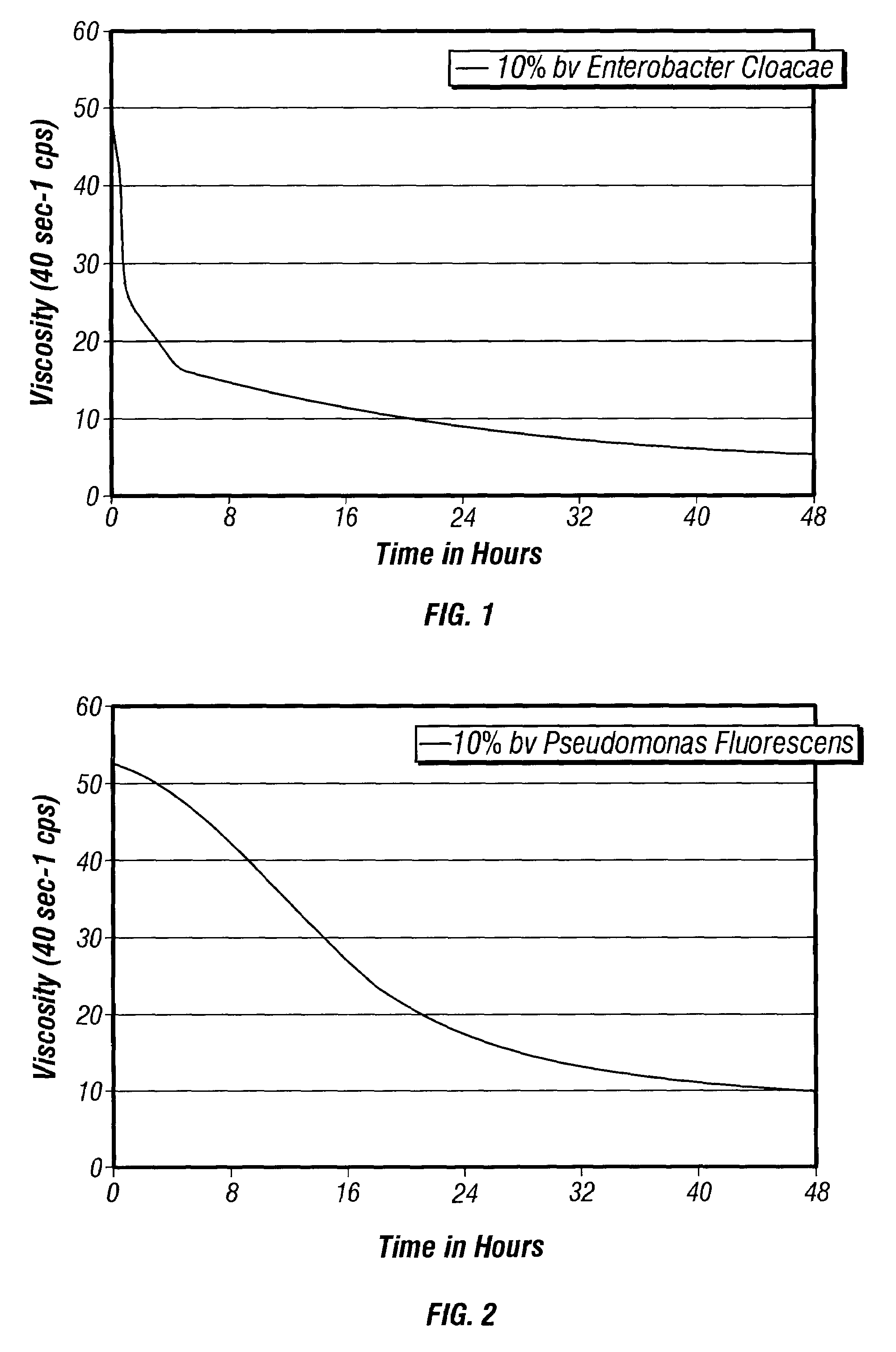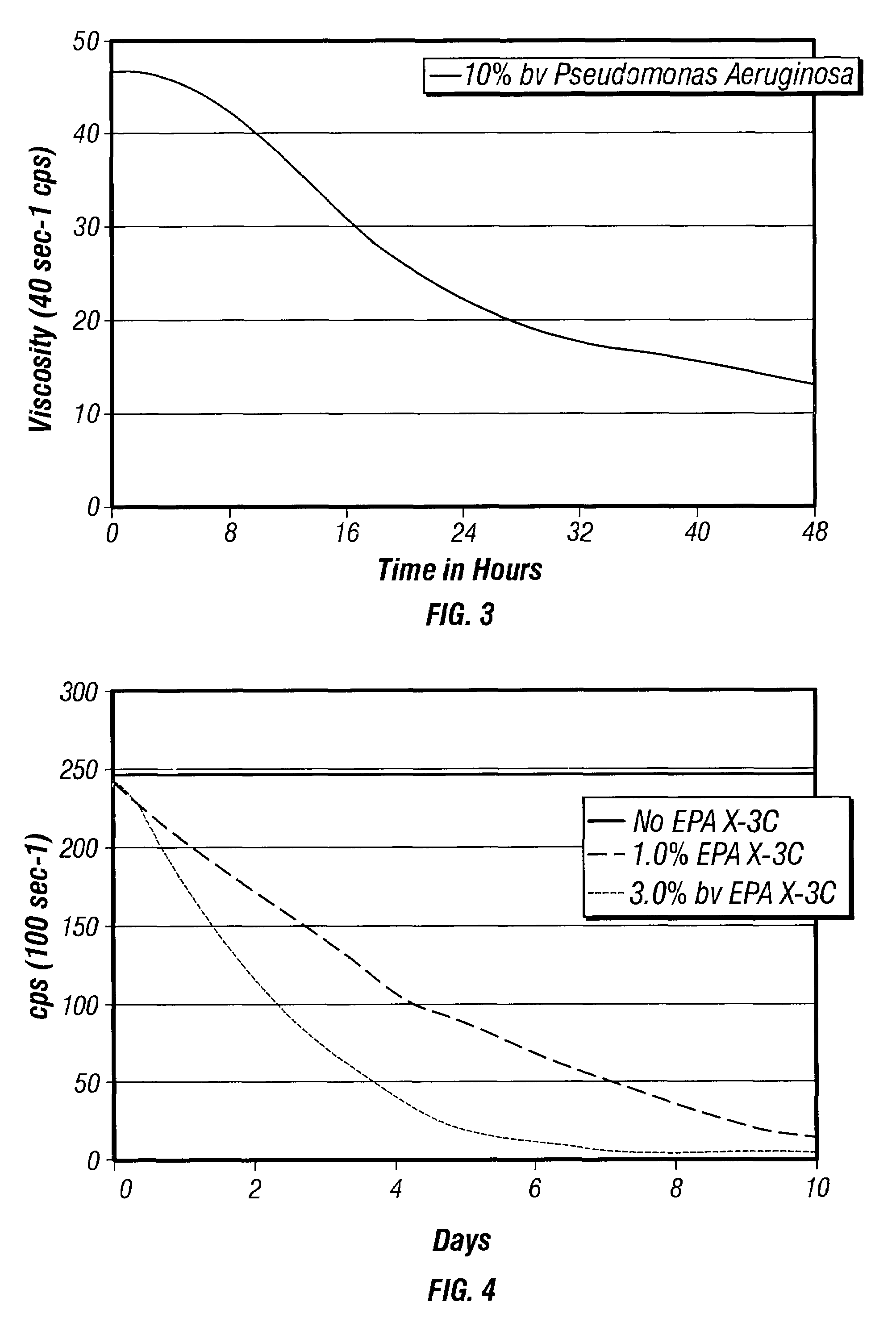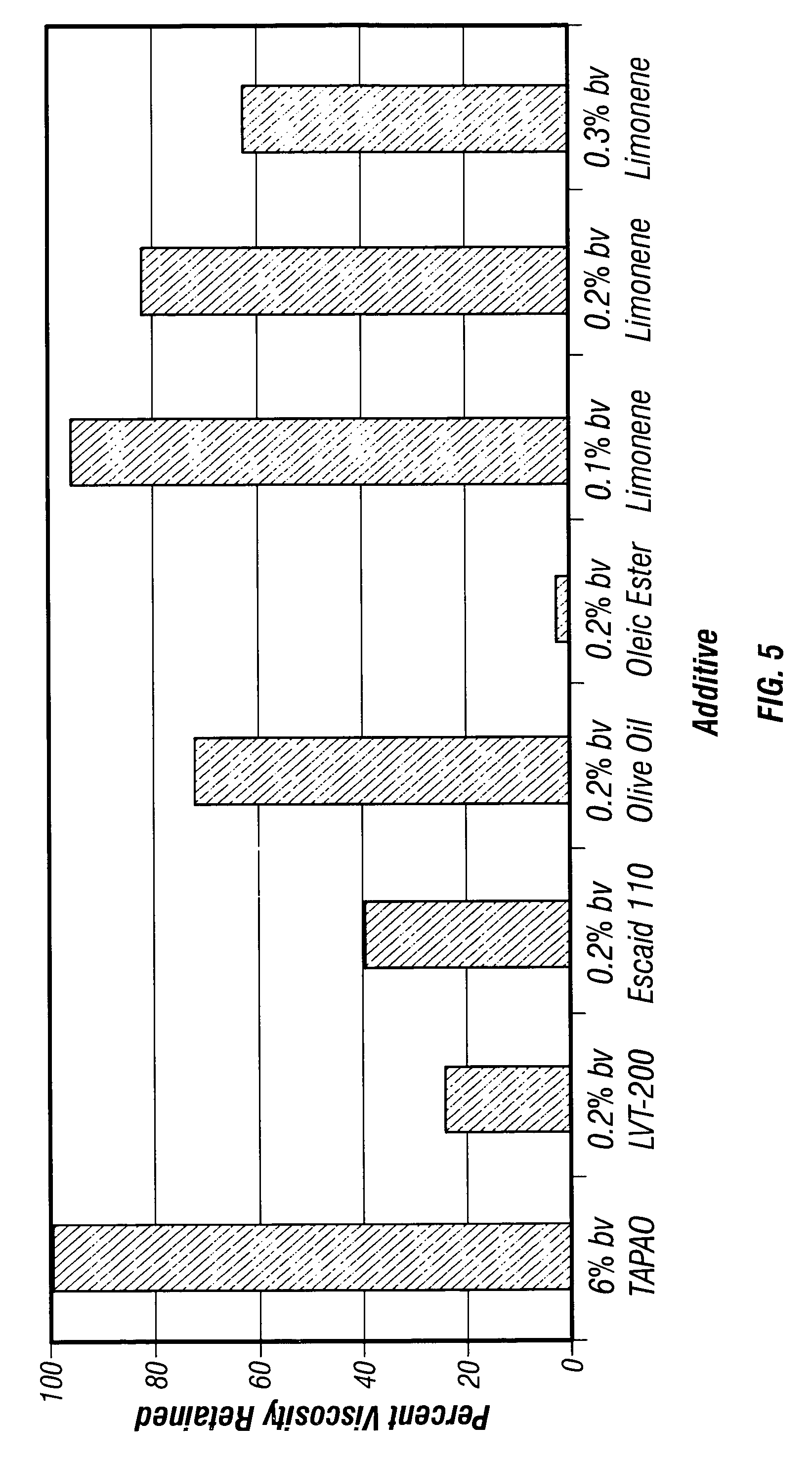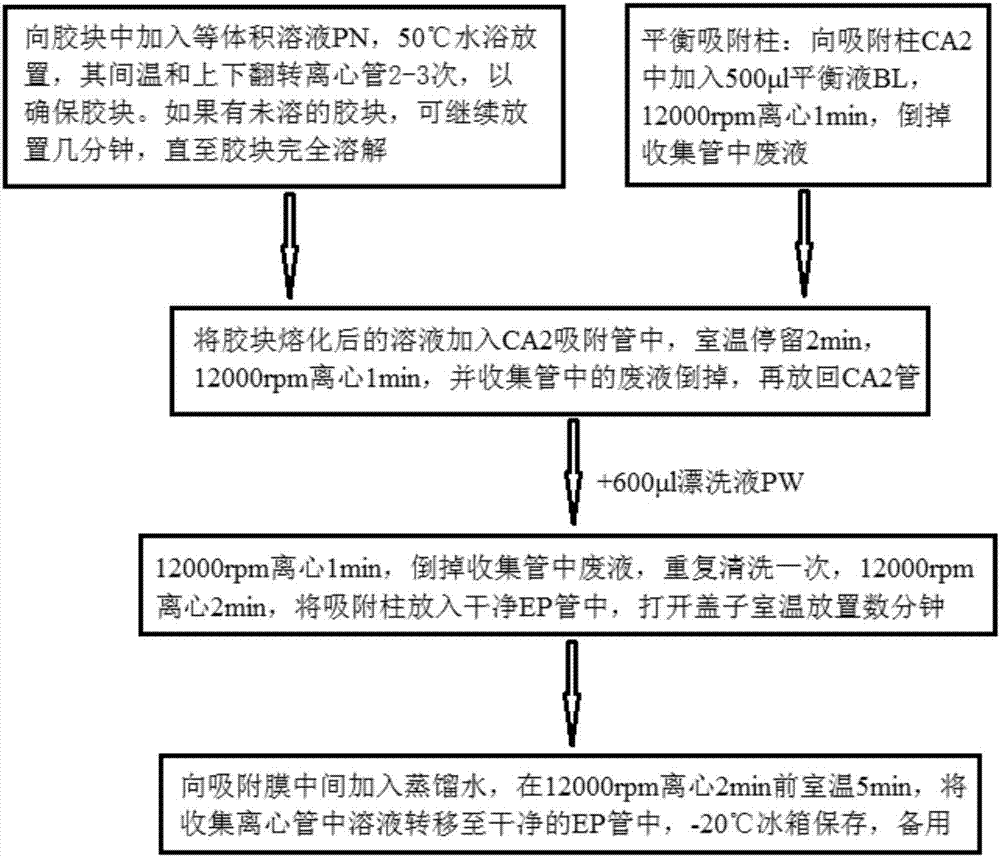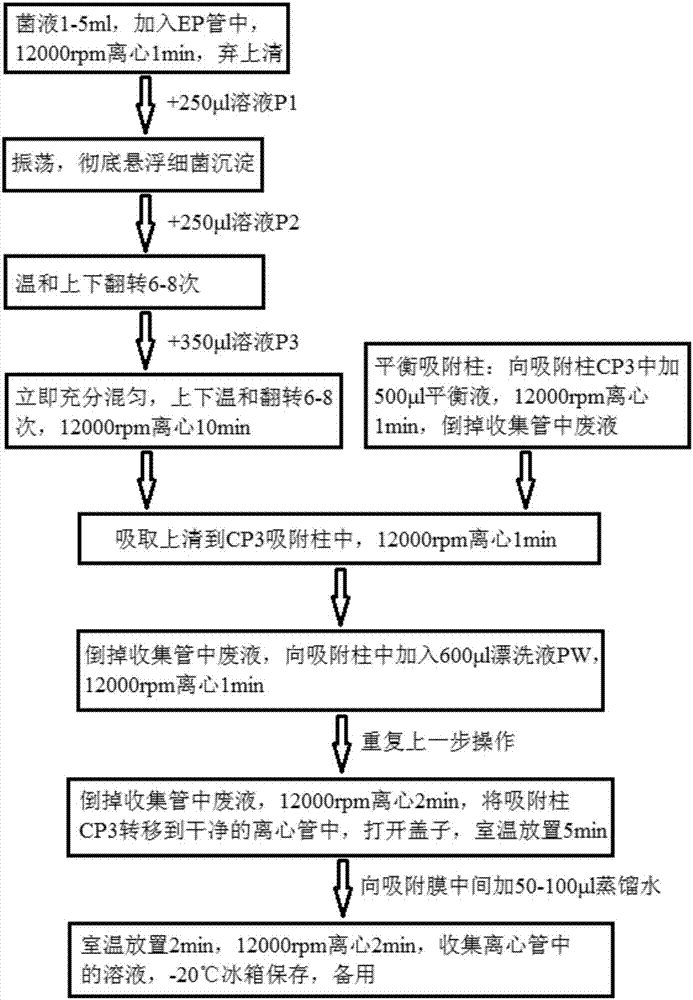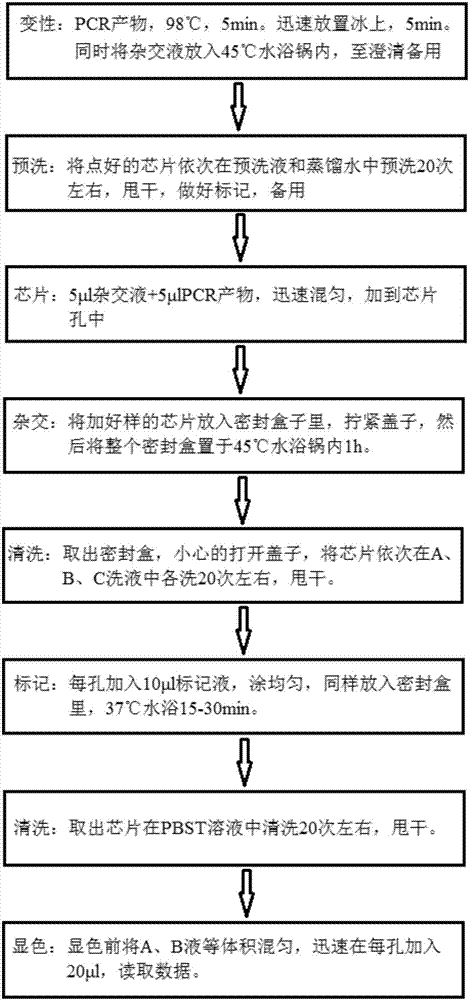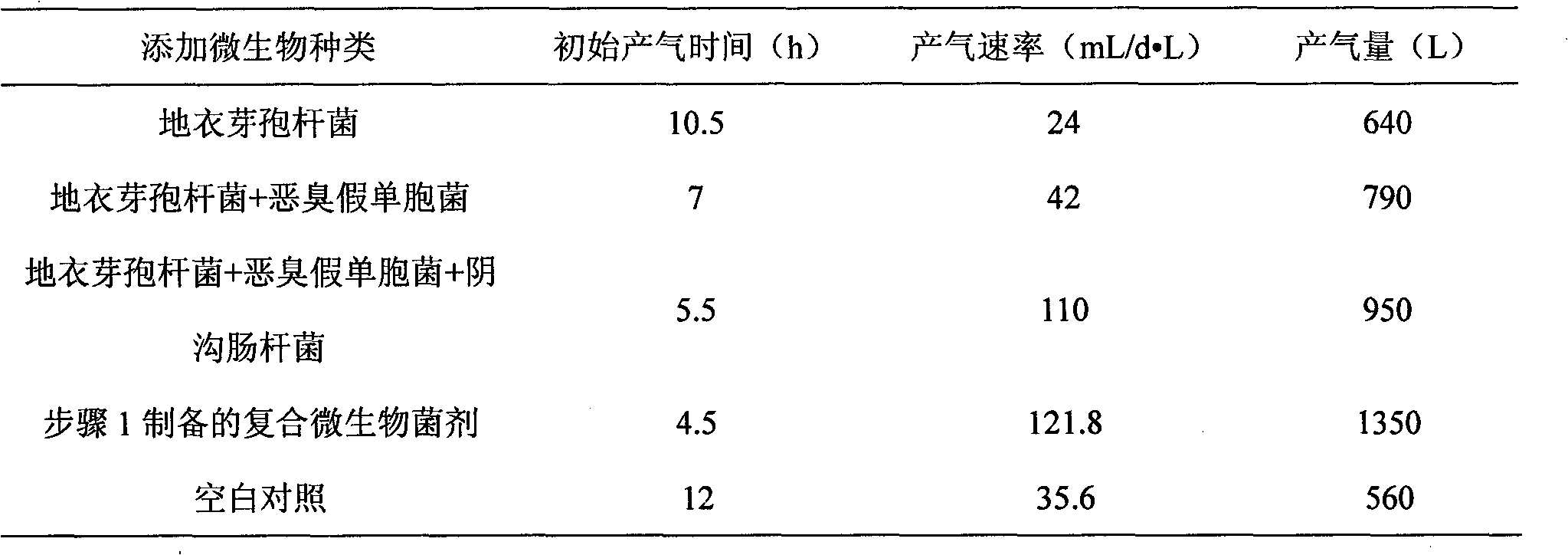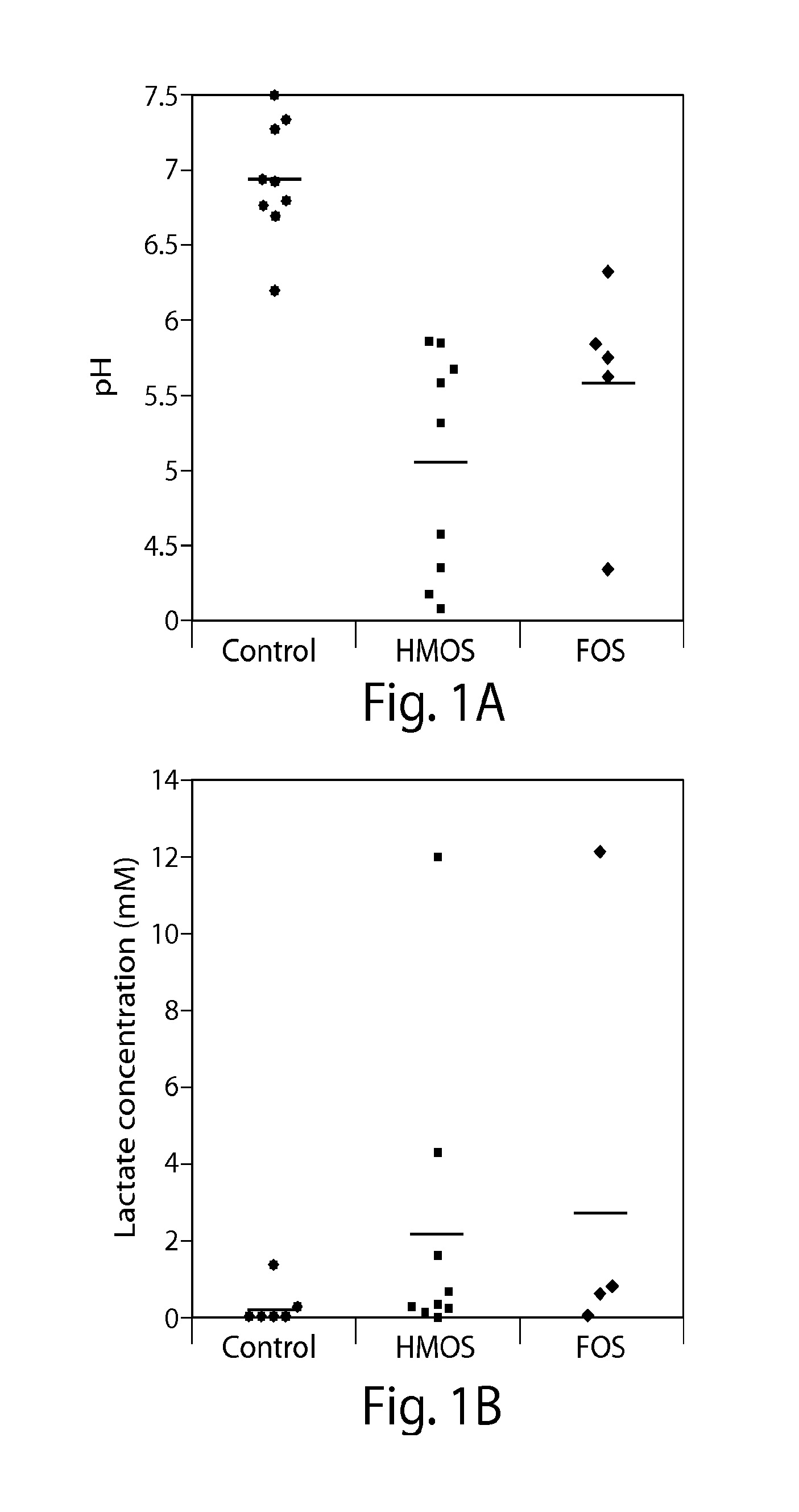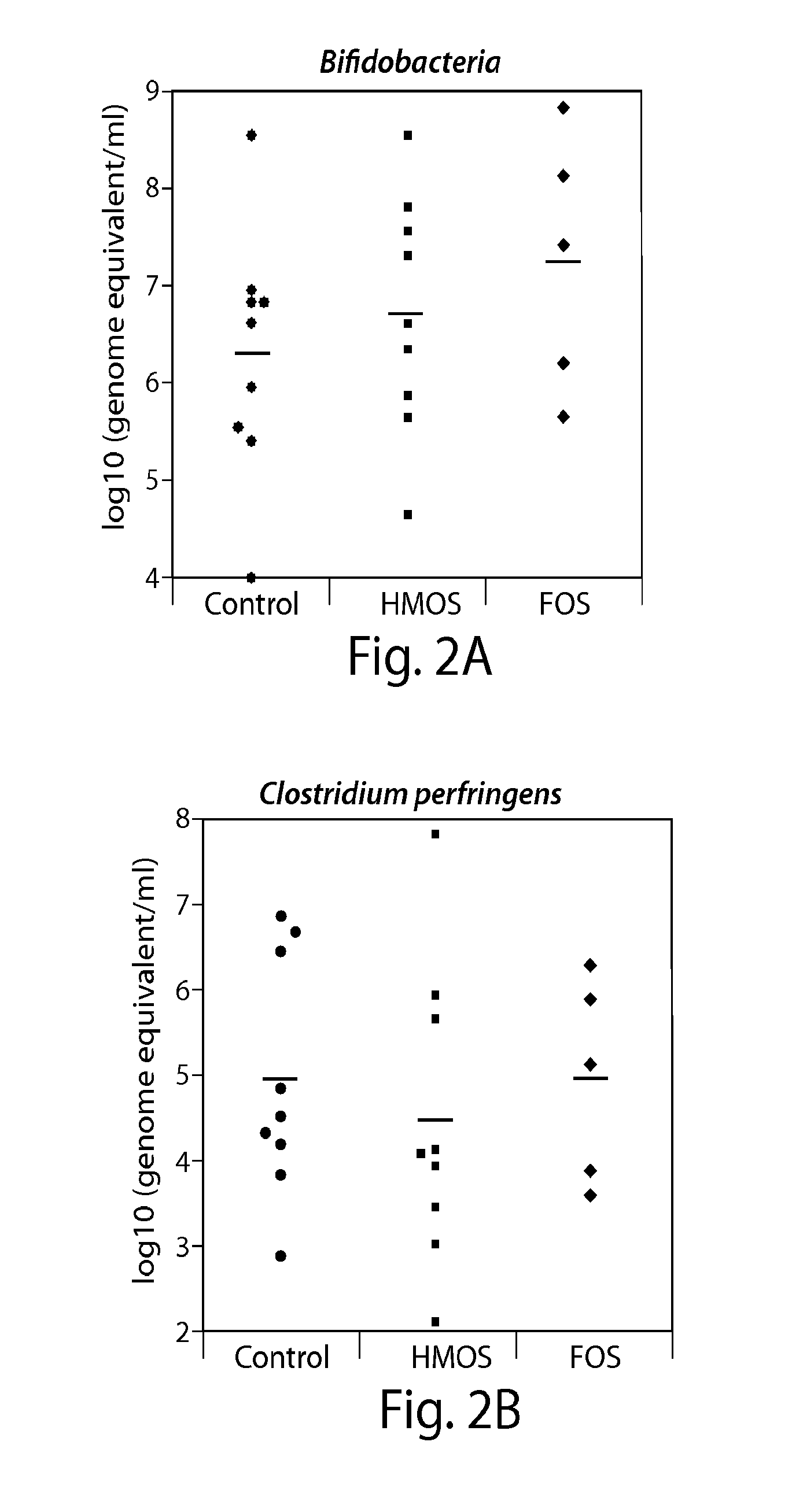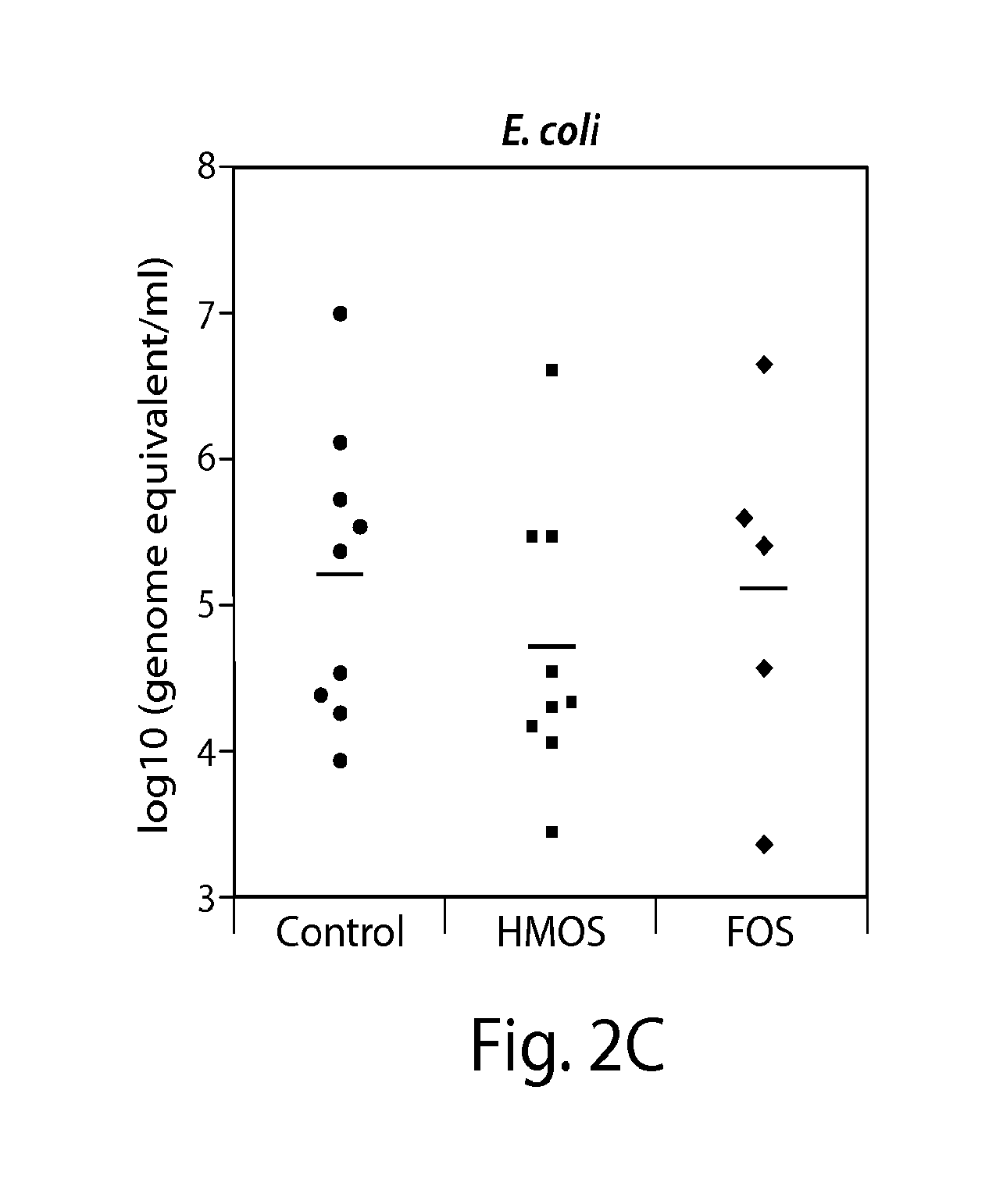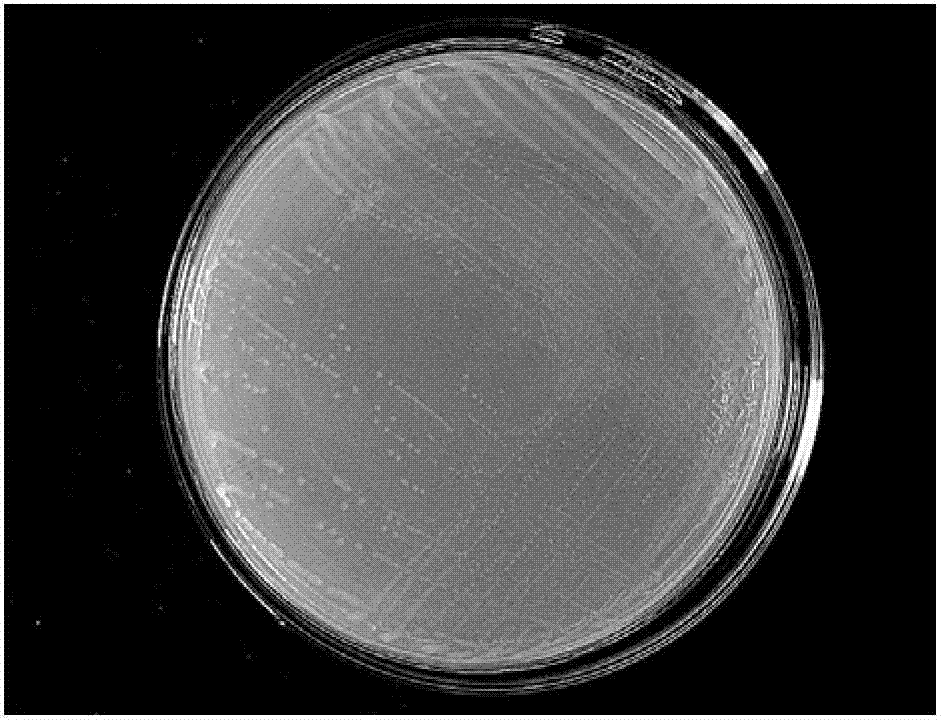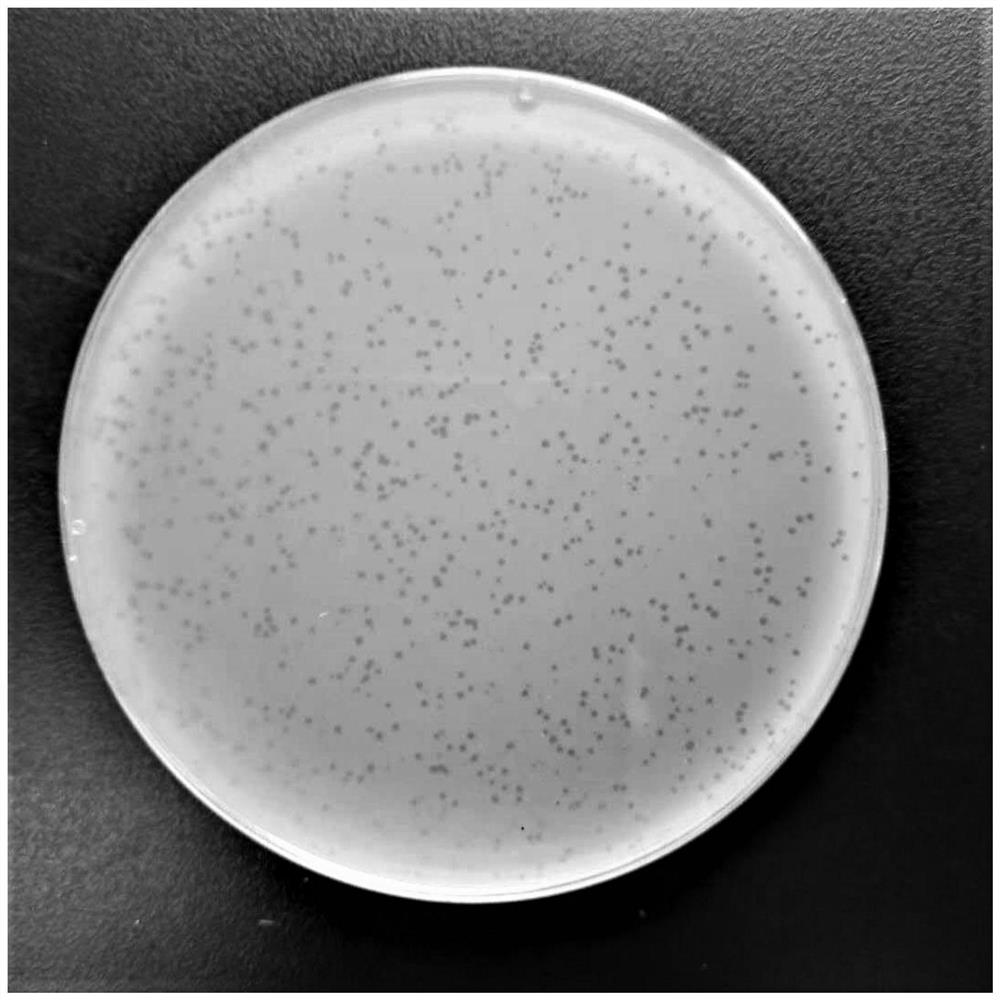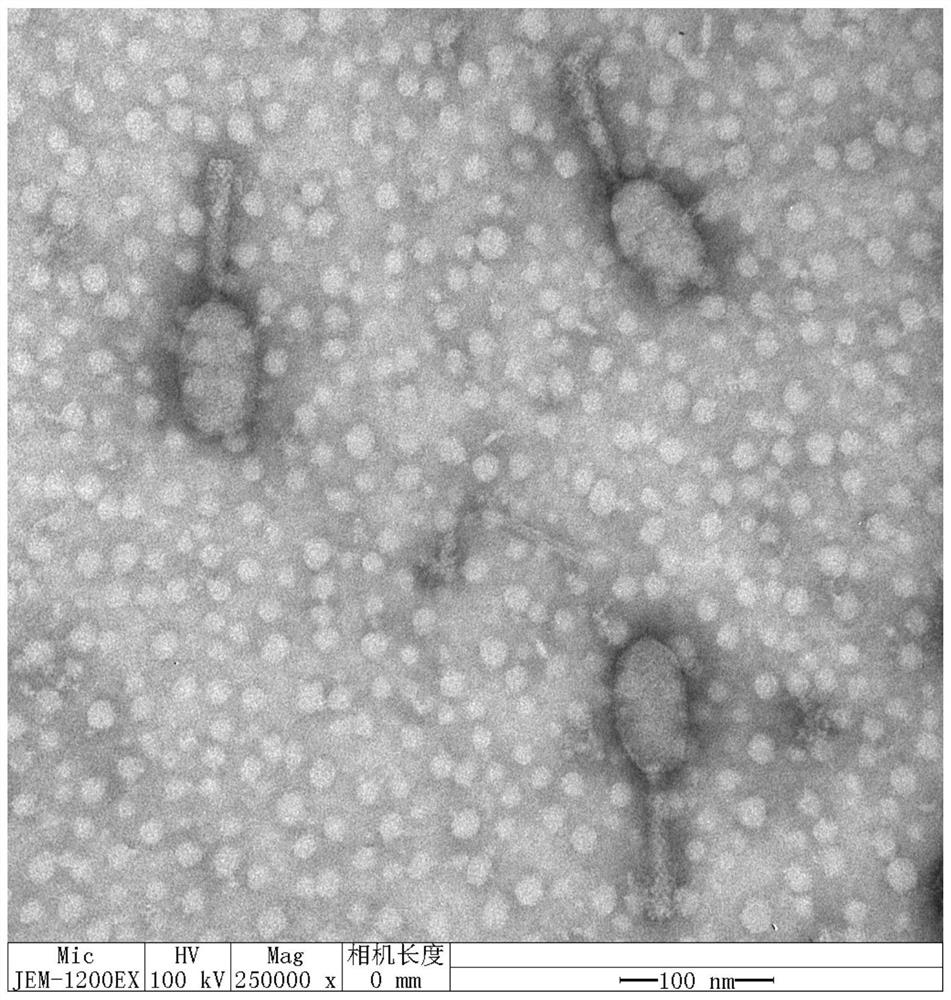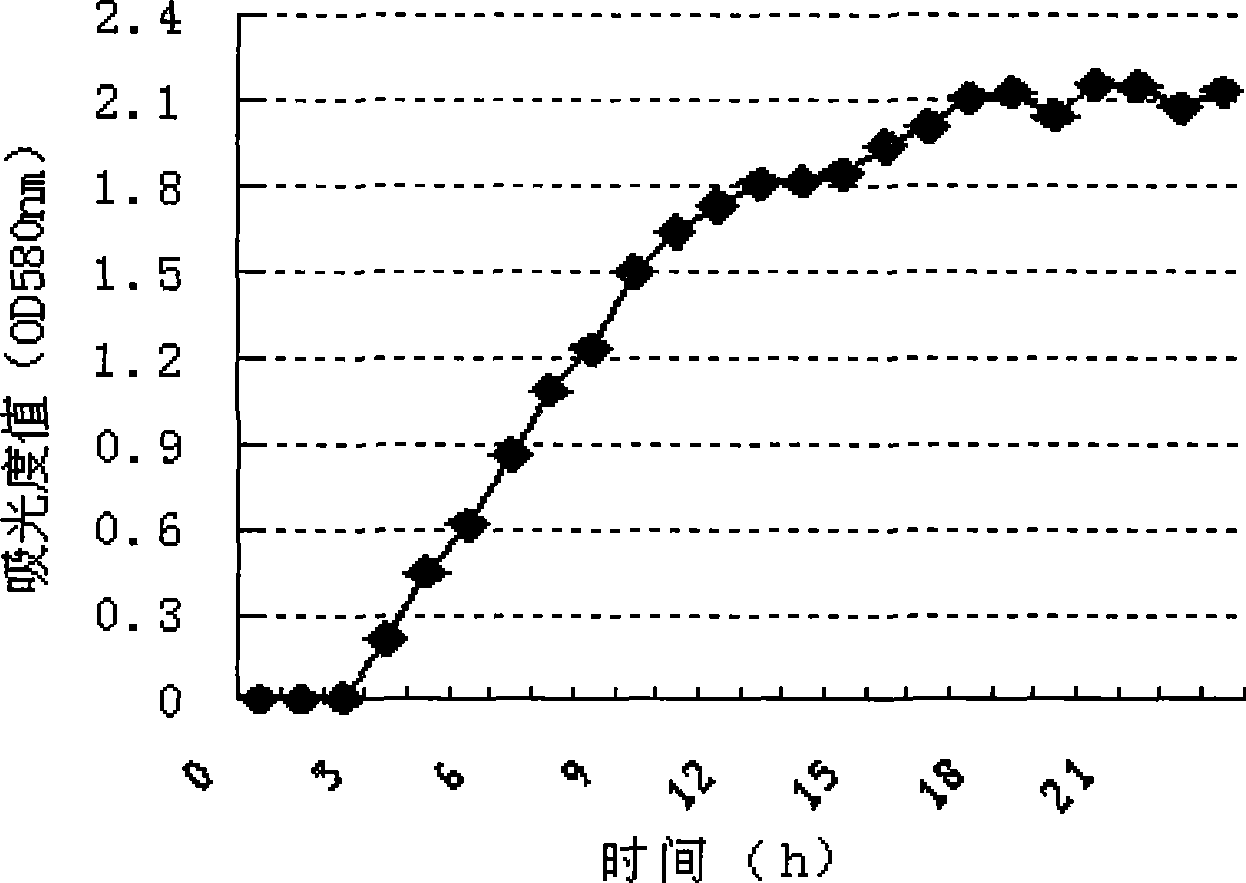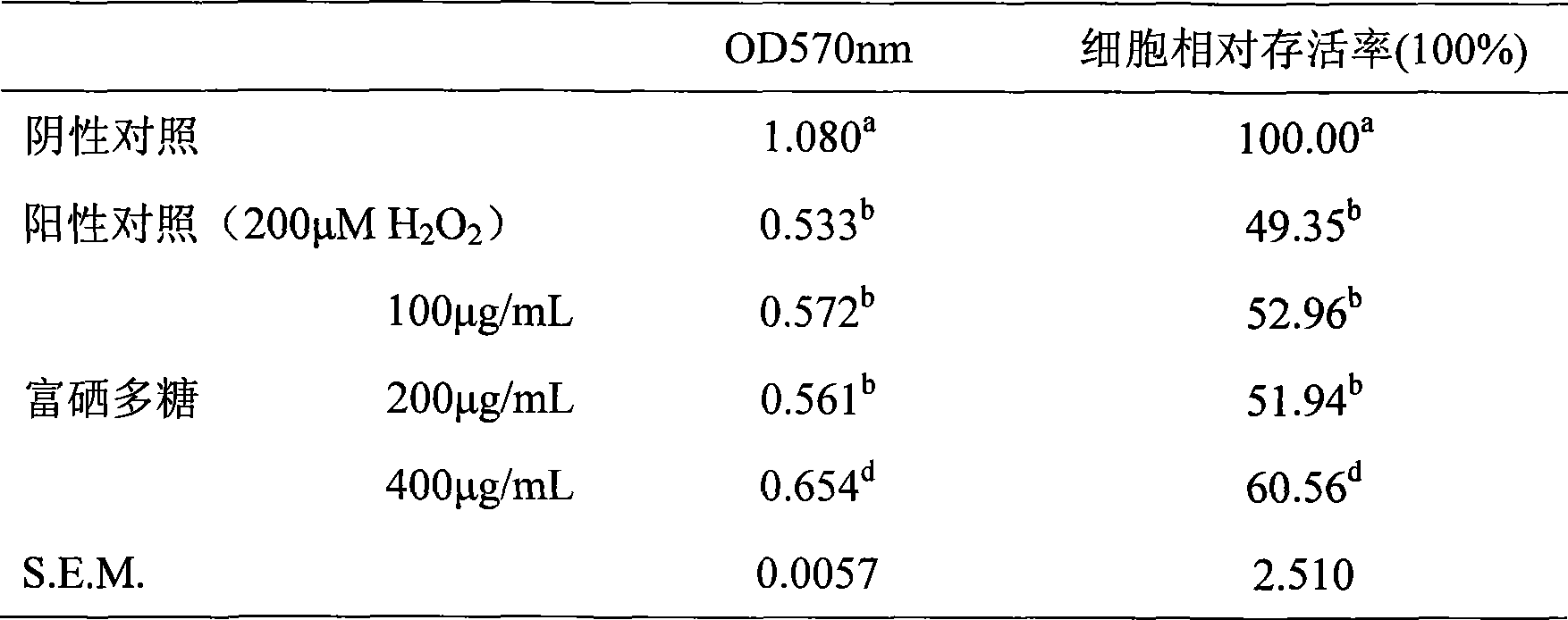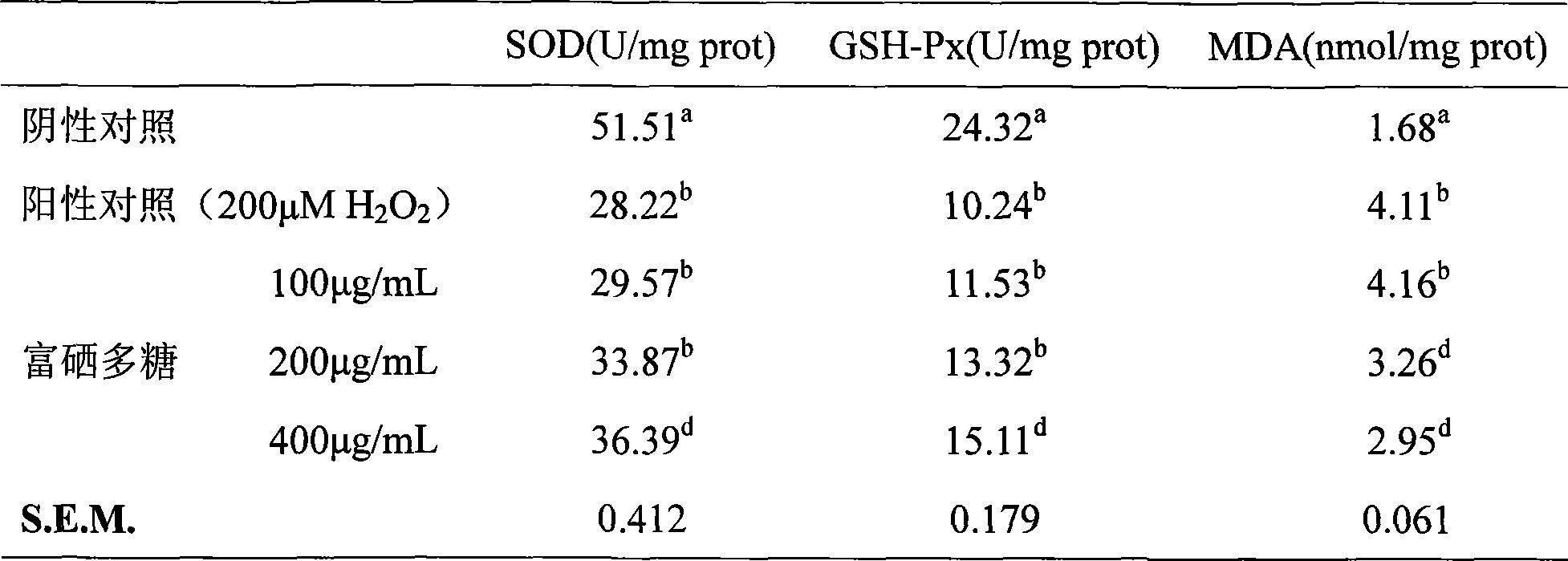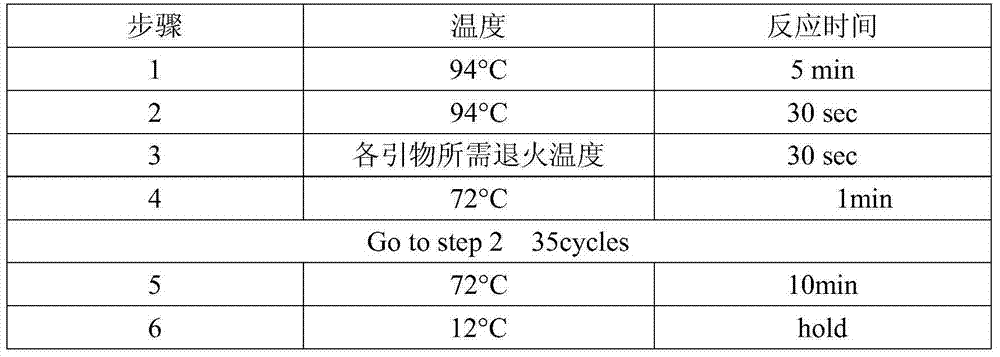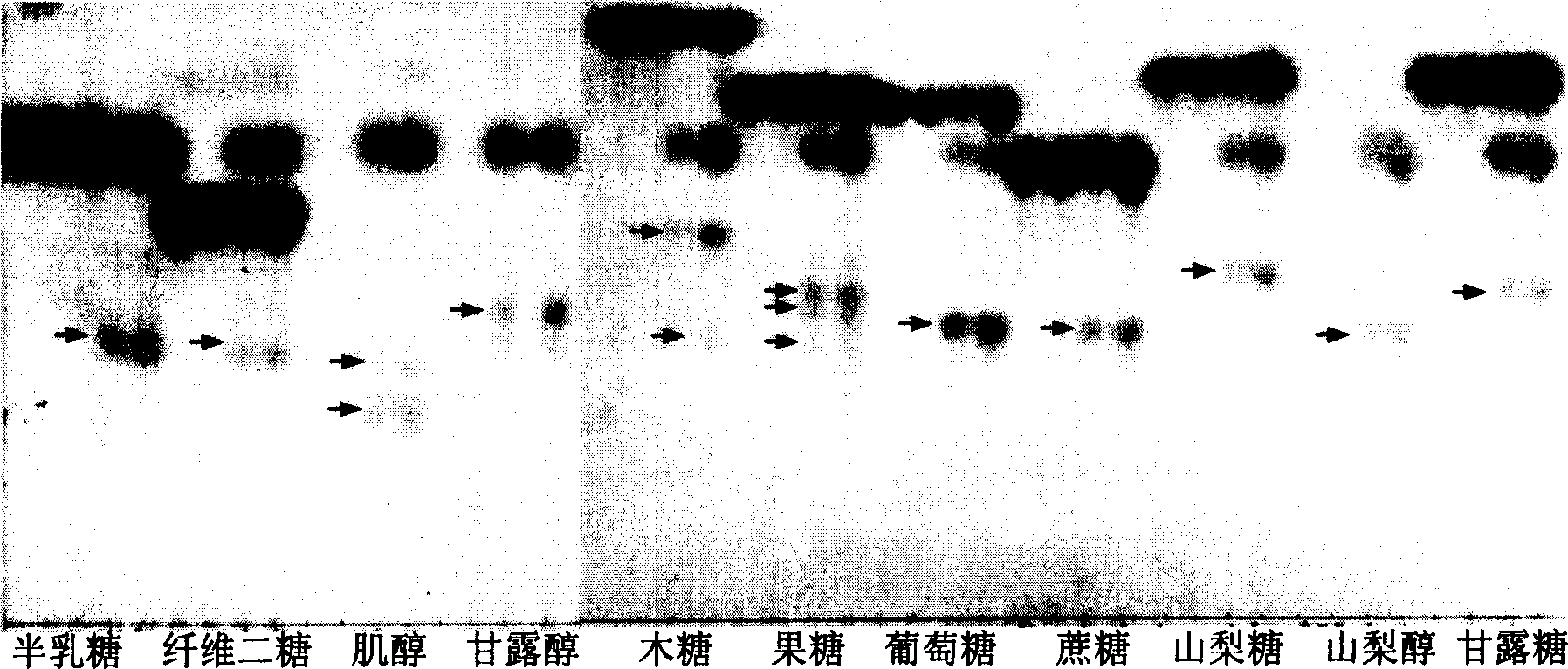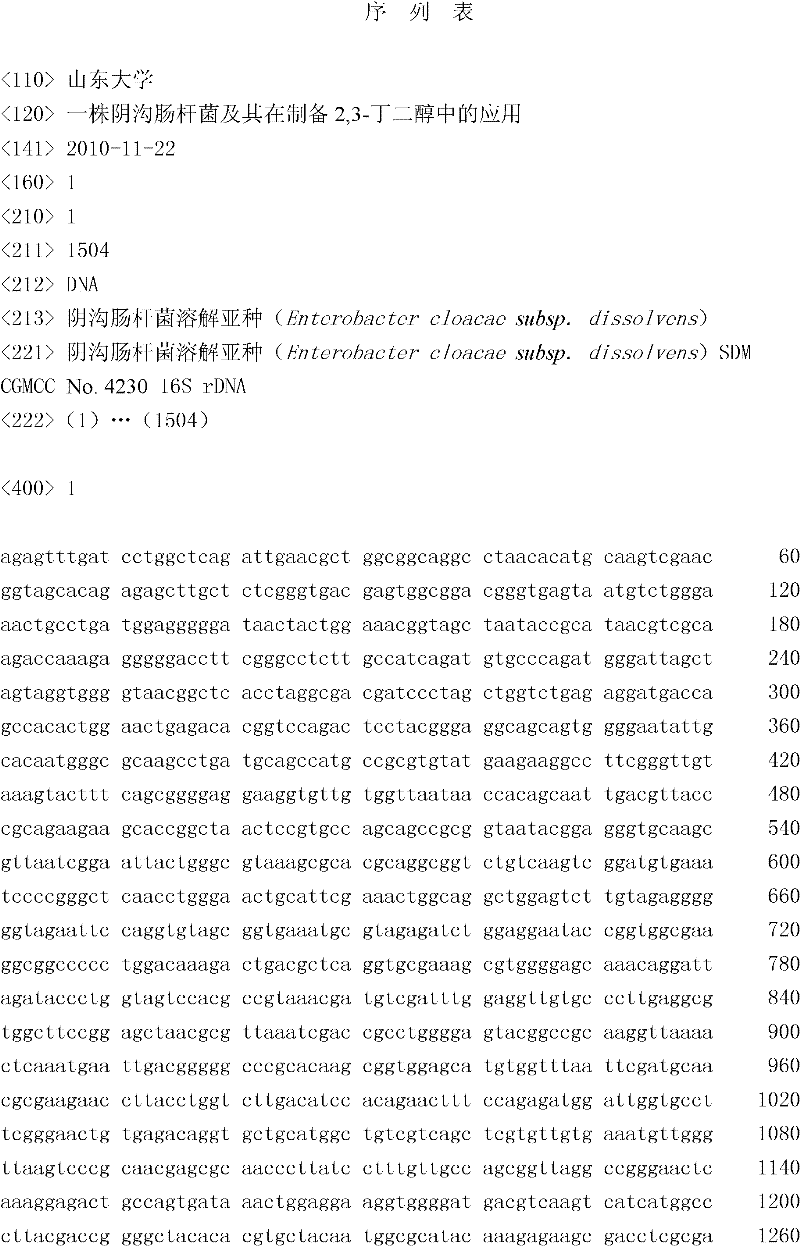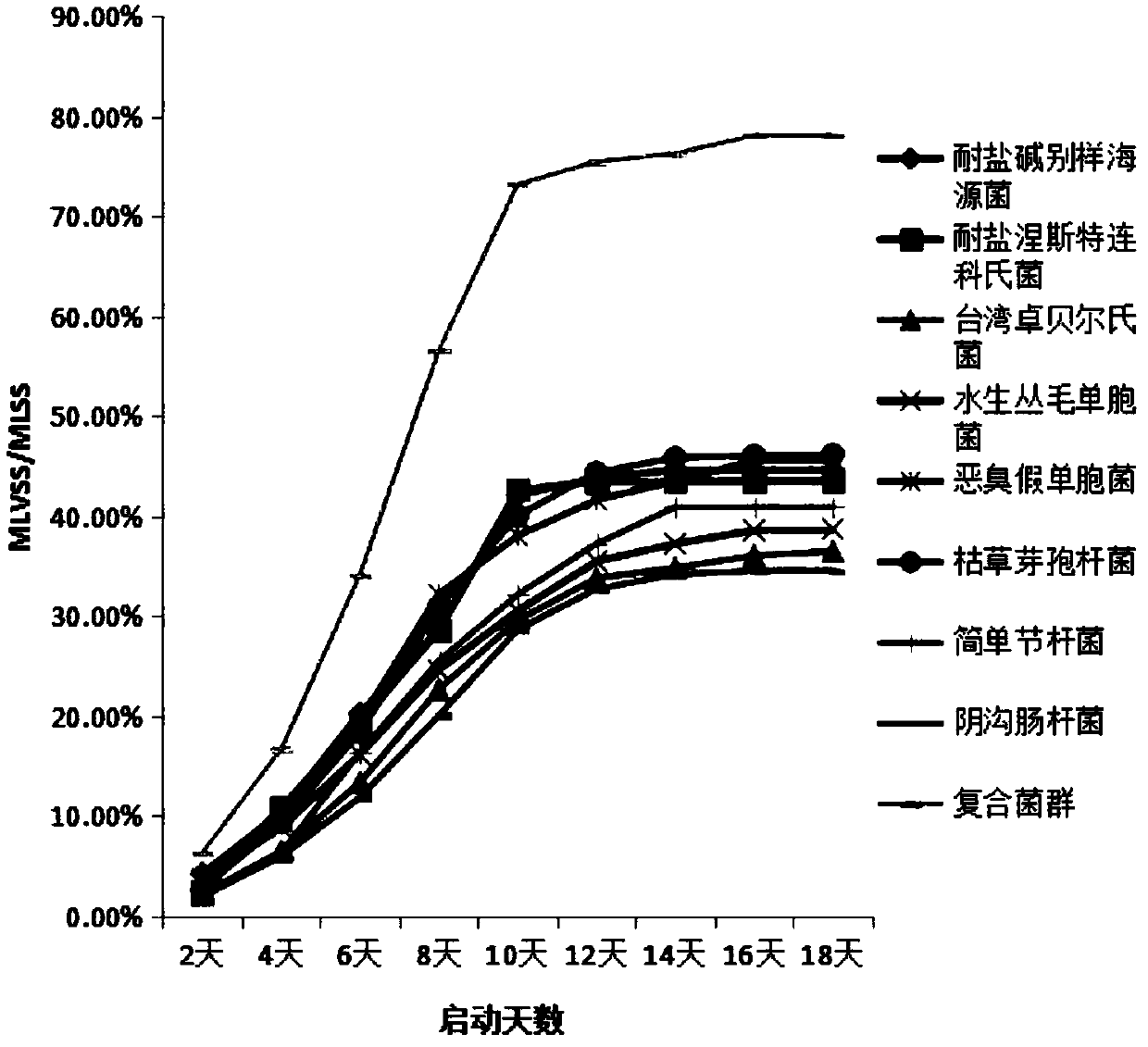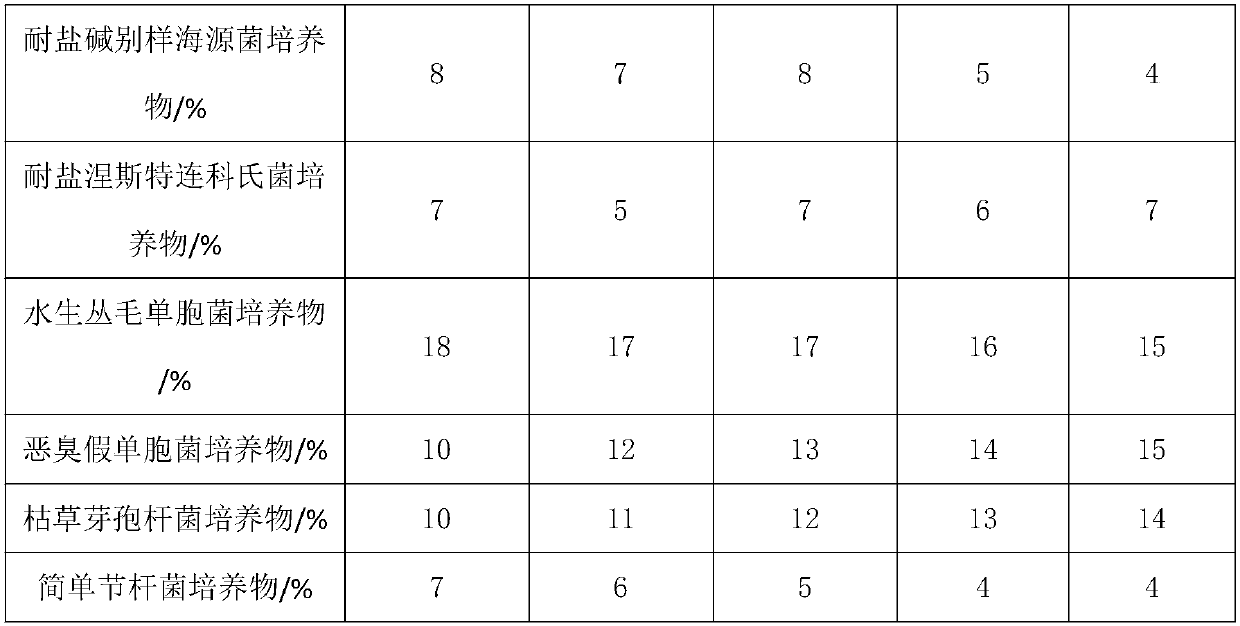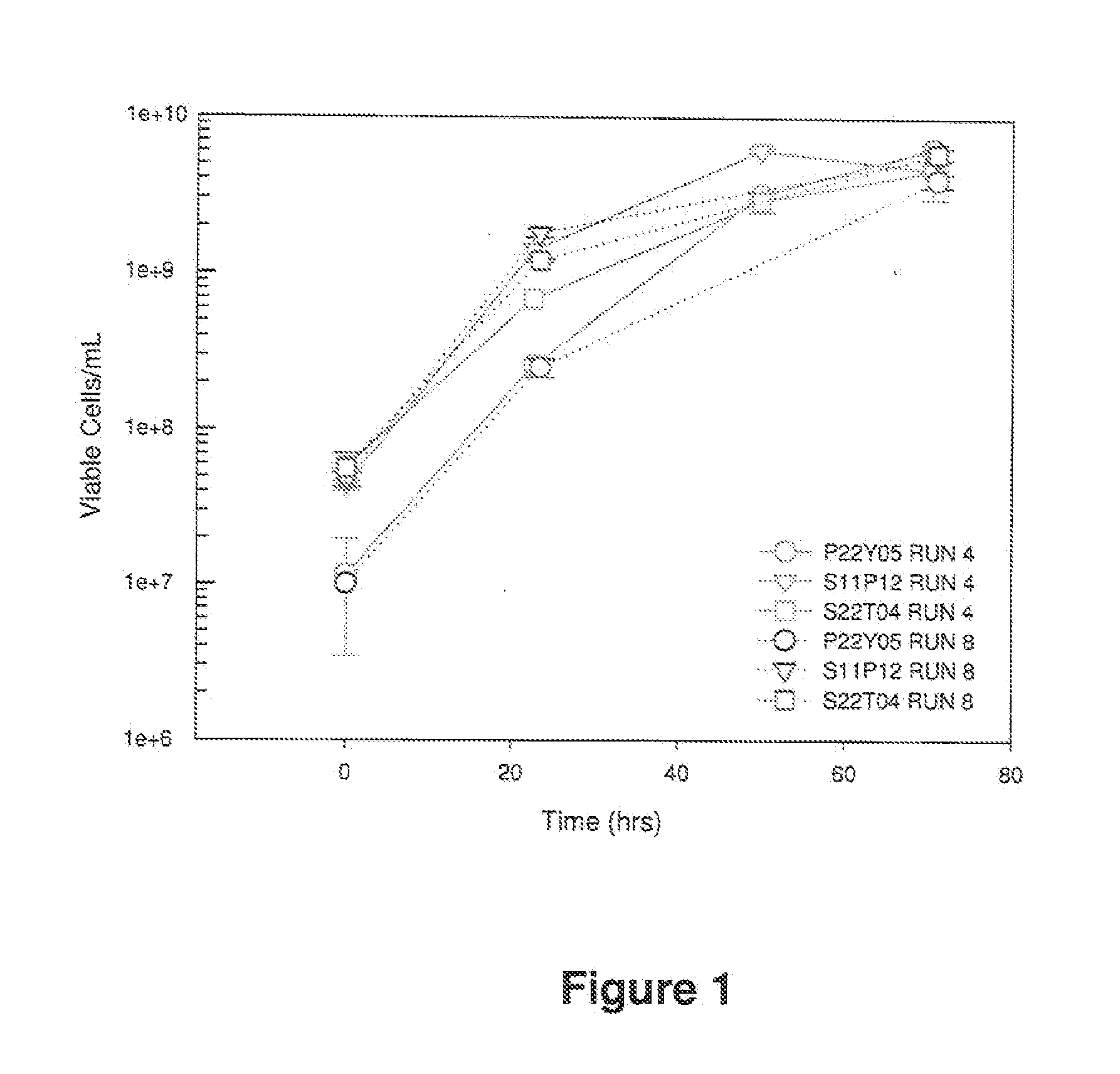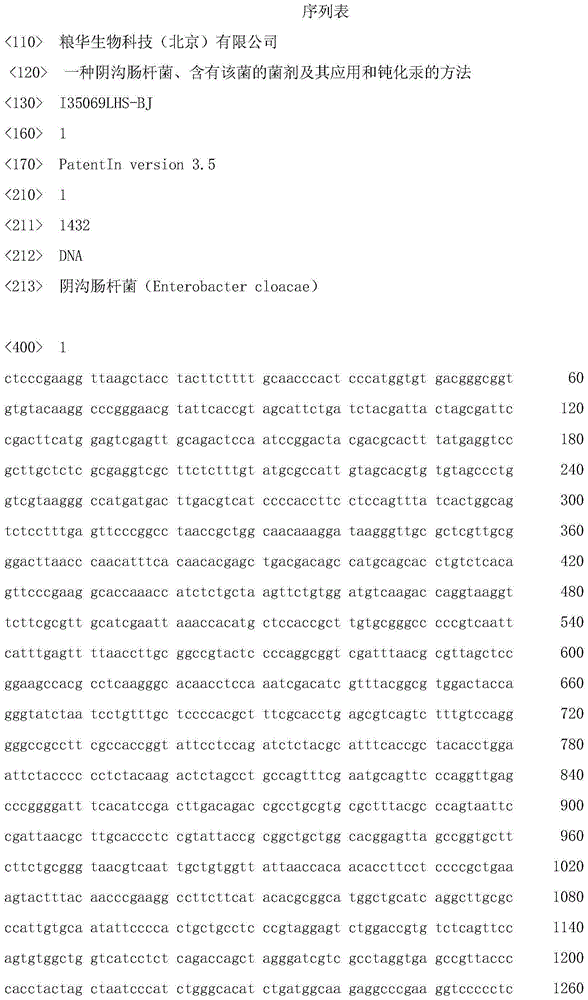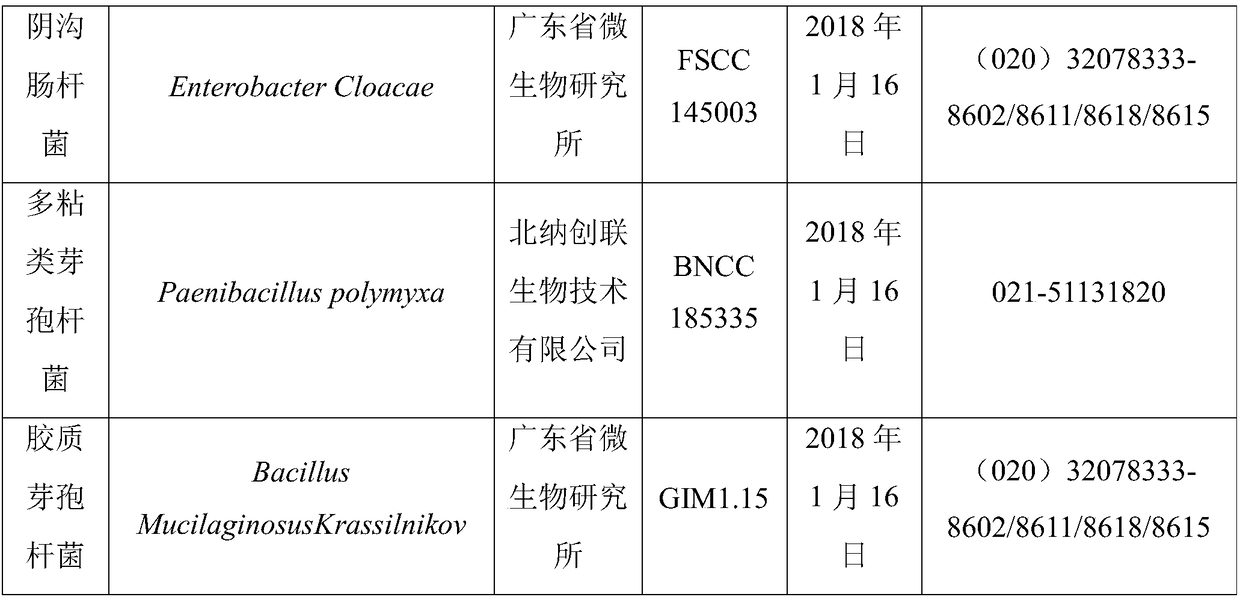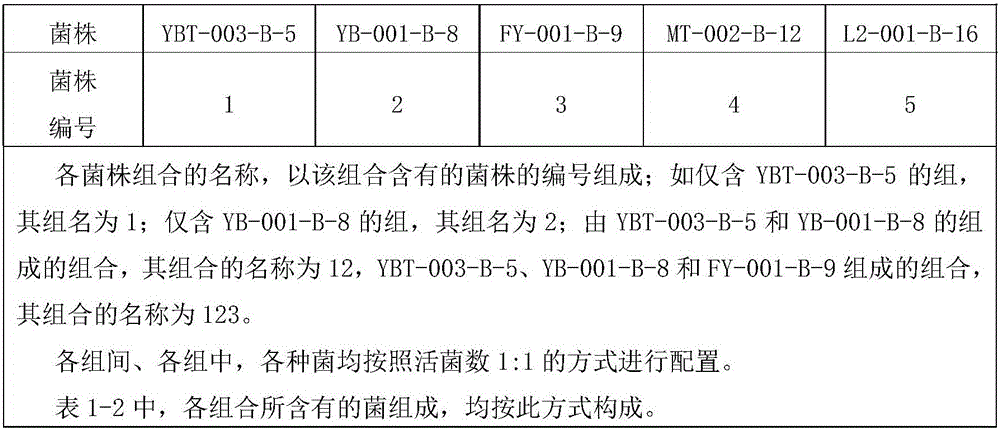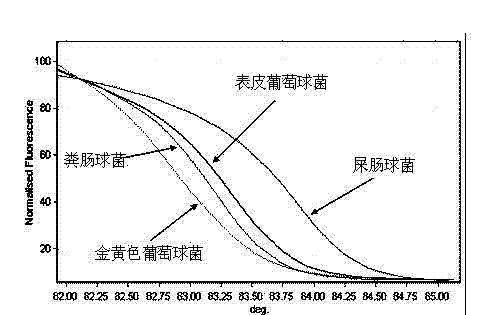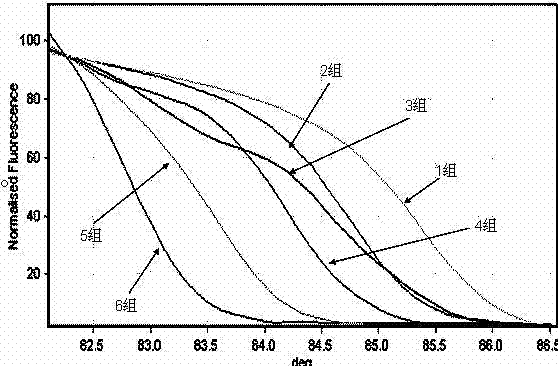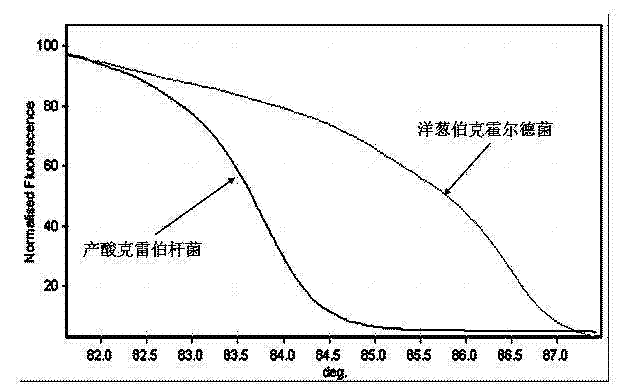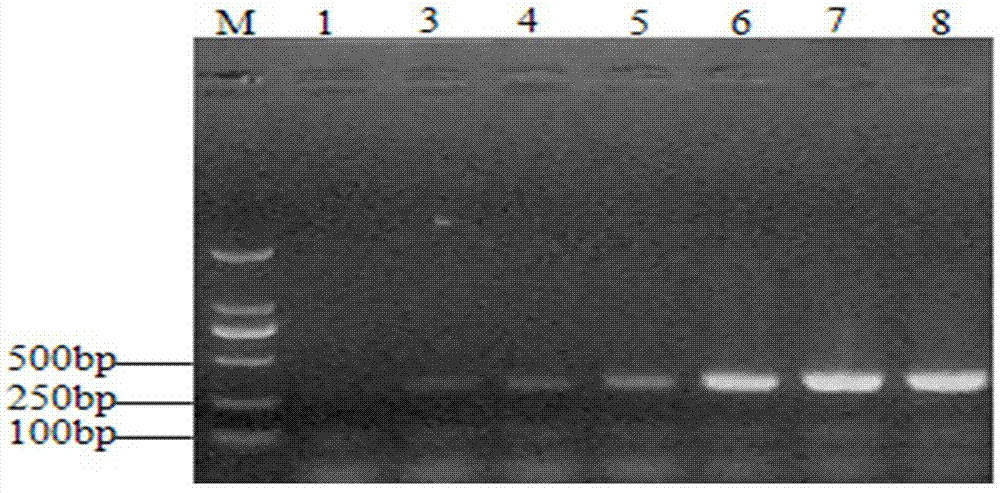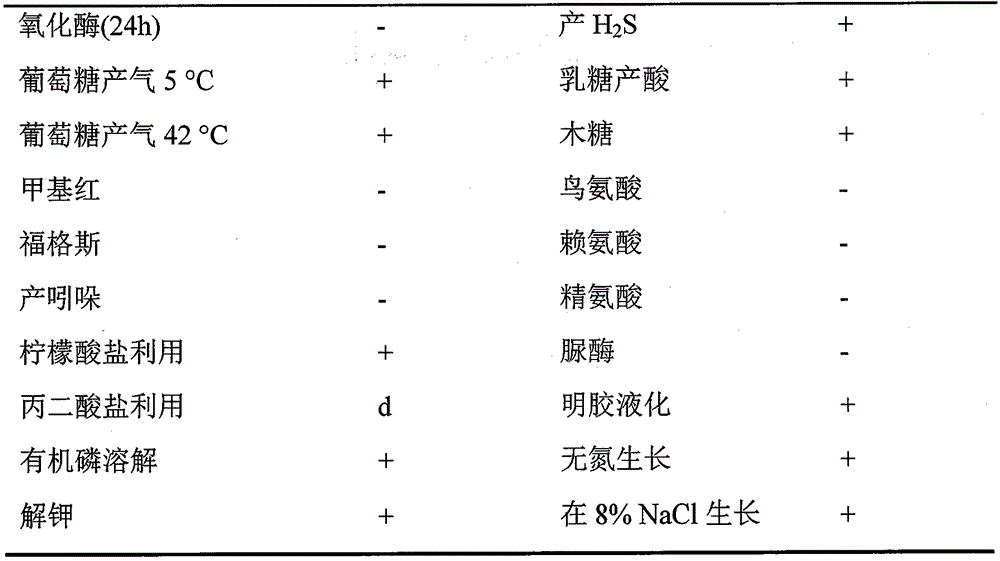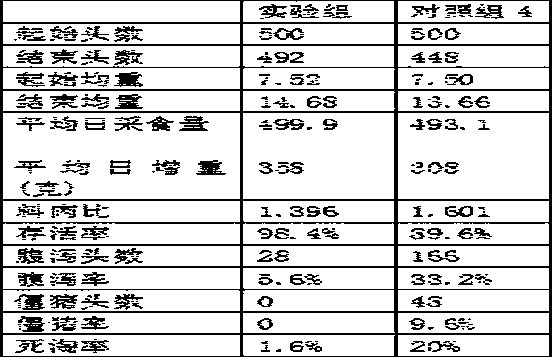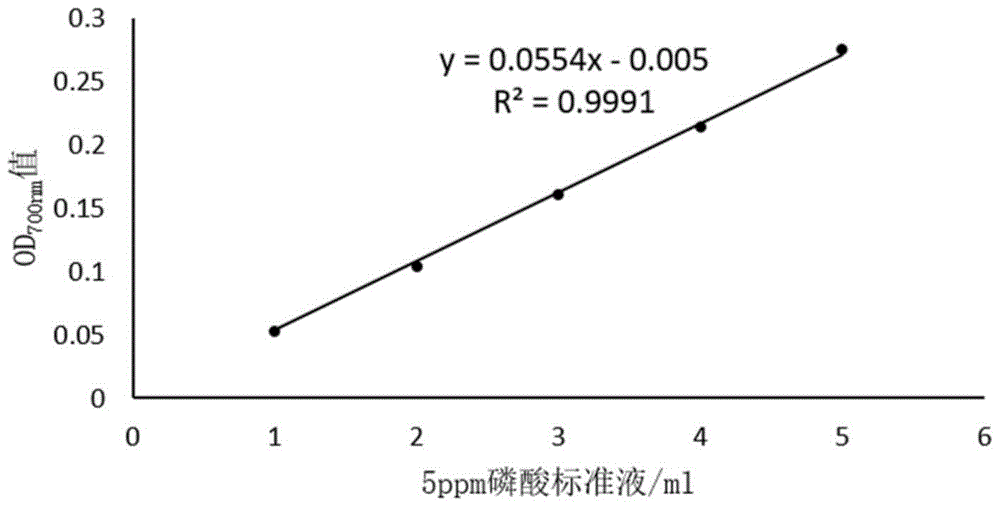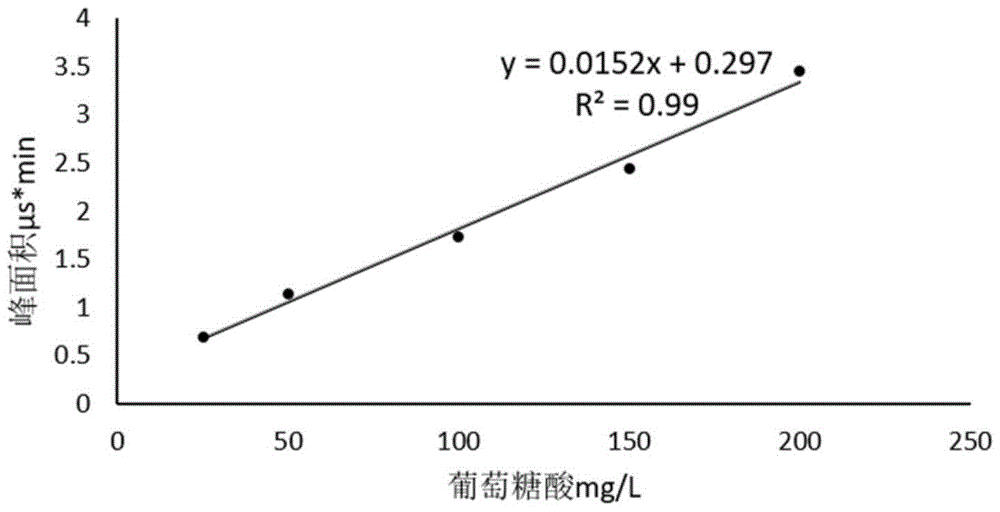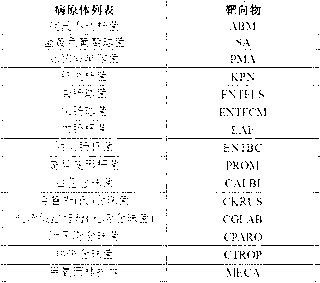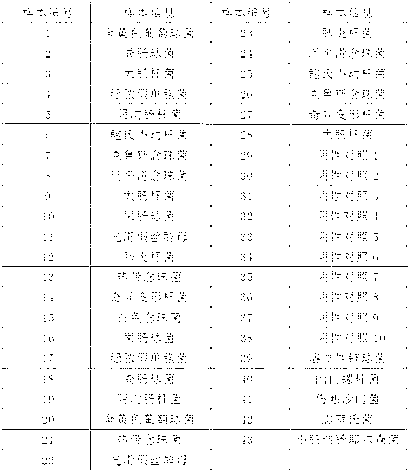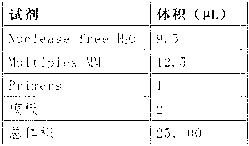Patents
Literature
Hiro is an intelligent assistant for R&D personnel, combined with Patent DNA, to facilitate innovative research.
206 results about "Enterobacter cloacae" patented technology
Efficacy Topic
Property
Owner
Technical Advancement
Application Domain
Technology Topic
Technology Field Word
Patent Country/Region
Patent Type
Patent Status
Application Year
Inventor
Enterobacter cloacae is a clinically significant Gram-negative, facultatively-anaerobic, rod-shaped bacterium.
Nucleic acid and amino acid sequences relating to Enterobacter cloacae for diagnostics and therapeutics
InactiveUS7041814B1Easy to adaptBacteriaSugar derivativesEnterobacter cloacaeNucleic acid sequencing
The invention provides isolated polypeptide and nucleic acid sequences derived from Enterobacter cloacae that are useful in diagnosis and therapy of pathological conditions; antibodies against the polypeptides; and methods for the production of the polypeptides. The invention also provides methods for the detection, prevention and treatment of pathological conditions resulting from bacterial infection.
Owner:GENOME THERAPEUTICS
Bacteria-based and enzyme-based mechanisms and products for viscosity reduction breaking of viscoelastic fluids
ActiveUS7052901B2Low viscosityBreak viscosityDeodrantsFlushingIndirect actionPseudomonas fluorescens
It has been discovered that fluids viscosified with viscoelastic surfactants (VESs) may have their viscosities reduced (gels broken) by the direct or indirect action of a biochemical agent, such as bacteria, fungi, and / or enzymes. The biochemical agent may directly attack the VES itself, or some other component in the fluid that produces a by-product that then causes viscosity reduction. The biochemical agent may disaggregate or otherwise attack the micellar structure of the VES-gelled fluid. The biochemical agent may produce an enzyme that reduces viscosity by one of these mechanisms. A single biochemical agent may operate simultaneously by two different mechanisms, such as by degrading the VES directly, as well as another component, such as a glycol, the latter mechanism in turn producing a by-product (e.g. an alcohol) that causes viscosity reduction. Alternatively, two or more different biochemical agents may be used simultaneously. In a specific, non-limiting instance, a brine fluid gelled with an amine oxide surfactant can have its viscosity broken with bacteria such as Enterobacter cloacae, Pseudomonas fluorescens, Pseudomonas aeruginosa, and the like.
Owner:BAKER HUGHES INC
Kit for quickly detecting 15 pneumonia pathogenic bacteria
ActiveCN107338315AMicrobiological testing/measurementMicroorganism based processesBacteroidesStaphylococcus aureus
The invention discloses a kit for quickly detecting 15 pneumonia pathogenic bacteria. The kit can detect streptococcus pneumoniae, staphylococcus aureus, haemophilus influenzae, mycoplasma pneumoniae, pseudomonas aeruginosa, baumanii, enterococcus faecalis, enterococcus faecium, klebsiella pneumoniae, escherichia coli, enterobacter cloacae, stenotrophomonas maltophilia, burkholderia cepacia, legionella pneumophila and chlamydia pneumoniae which cover clinically common pneumonia pathogenic bacteria difficult to culture. 16S rDNA and specific gene sequences corresponding to the pneumonia pathogenic bacteria are detected by combining gene chips with multiple asymmetric PCR reactions, and the categories of the bacteria in a to-be-detected sample are identified in genus and species. The kit makes up for the defect that current clinical detection of pneumonia pathogenic bacteria is not in time or comprehensive and a novel detection means for early diagnosis and early treatment of patients suffering from pneumonia is provided.
Owner:GENERAL HOSPITAL OF PLA +1
Compound microbial bacterial preparation and application thereof
InactiveCN101864362AOvercoming the problem of only targeting a single organic wastePromote enrichmentFungiBacteriaCelluloseBacillus licheniformis
The invention belongs to the technical field of environment protection and discloses a compound microbial bacterial preparation and application thereof. The compound microbial bacterial preparation consists of fermentation liquor of four bacteria, i.e. Bacillus licheniformis, Pseudomonas putida, Enterobacter cloacae and Candida valida. The compound microbial bacterial preparation provided by the invention has strong digestion power for various types of cellulose, proteins and fat macromolecules. The addition of the compound microbial bacterial preparation into excess sludge and / or kitchen waste can quicken enrichment of methanogen, shorten anaerobic digestion time and improve methane yield. Moreover, the synergetic effect of the four microbial strains is superior to the effect of any one, two or three strains of microorganisms.
Owner:江苏加德绿色能源有限公司
Prebiotic effect of sialyllactose
InactiveUS20150265661A1Promote growthHigh prebiotic effectBiocideOrganic active ingredientsBacteroidesOligosaccharide
Provided herein are prebiotic compositions comprising a combination of oligosaccharides such as sialyated oligosaccharides and fusocylated oligosaccharides, and uses thereof in stimulating the proliferation of beneficial intestinal micro biota, for example, of bifidobacteria, and / or in decreasing the abundance of enteric pathogens. The prebiotic compositions can further contain a probiotic, which can be a population of bifidobacteria, lactobacilli, Bacteriodes fragilis, Bacteriodes thetaiotaomicron, Enterococcus faecalis (pro biotic strains thereof), Staphylococcus epidermides, Enterobacter aerogenes, Enterobacter cloacae, or related bacteria having similar functions.
Owner:BOSTON COLLEGE
Micro-capsulated suspended microbial seed coating agent and preparation method thereof
InactiveCN104430307AReduce adverse effectsGuaranteed effective bacteria contentBiocidePlant growth regulatorsSurvivabilityPseudomonas
The invention relates to a micro-capsulated suspended microbial seed coating agent and a preparation method thereof. The micro-capsulated suspended microbial seed coating agent comprises a functional bacteria microcapsule and auxiliaries, wherein the functional bacteria microcapsule is prepared from wall materials such as sodium alginate and gelatin by virtue of an endogenous emulsion process, the grain size of the microcapsule is 20-60 mu m, the content of functional bacteria is not lower than 10<9>cfu / g, and the embedding rate is over 80%. Functional microbes are selected from two or more of pseudomonas, bacillus subtilis, bacillus amyloliquefaciens, enterobacter cloacae, raoultella planticola and bacillus atrophaeus. The auxiliaries comprise one or more of a film-forming agent, a dispersant, a tackifier, an anti-freezing agent and a coloring agent. The prepared functional bacteria microcapsule is uniformly mixed with the auxiliaries to obtain a finished product. The product has the advantages of good film-forming performances, thallus persistence, high survivability, good slow-controlled release, strong application stability, environment friendliness, convenience in use, and the like, can be used for promoting seed germination and seedling growth of cottons, soya beans, wheat and potatoes, and the like, controlling the diseases at the seedling stage, improving stress resistance, and the like.
Owner:SHIHEZI UNIVERSITY +1
Enterobacter cloacae and application of enterobacter cloacae
ActiveCN102787088ATo achieve the effect of promoting growthAvoid discomfortBiocidePlant growth regulatorsGrowth plantGrowth promotion
The invention discloses enterobacter cloacae and application of the enterobacter cloacae. The enterobacter cloacae SXH-1 provided by the invention has the preservation number of CGMCC (China General Microbiological Culture Collection Center) No.6296. The invention also protects the application of the enterobacter cloacae SXH-1 to the plant growth promotion. The plant is concretely chives. The enterobacter cloacae SXH-1 provided by the invention can use ACC (aminocyclopropane carboxylic acid) as the unique nitrogen source for growth, and meanwhile, the ACC is decomposed. The strain is hopeful to realize important effects in the chive growth promotion aspect.
Owner:HARBIN NORMAL UNIVERSITY
Use of avian antibodies
InactiveUS20060134101A1Easy to produceSafe and effectiveEgg immunoglobulinsDigestive systemFowlMicroorganism
The present invention relates to a novel method for treatment and prophylaxis of infections, especially enteric infections, in newborns, which is both safe and effective. This is achieved by using IgY directed against microbes, in particular against Enterobacter cloacae, which have been obtained by hyperimmunising birds with an antigen (microbe) in order to stimulate the production of immunoglobulines (IgY) against such microbe. The present invention also relates to a pharmaceutical product from eggs of birds containing immunoglobuline or a fragment thereof, which can be combined with other preparations, nutritients or pharmaceuticals for simultaneous, separate or sequential use in the prophylaxis or therapy of gastrointestinal infections in newborn infants.
Owner:IMMUNSYST IMS
Broad-spectrum escherichia coli phage, composition and kit capable of simultaneously cracking four bacteria, and application of broad-spectrum escherichia coli phage
ActiveCN112680423AHighly toxicWide host rangeAntibacterial agentsAntipyreticBiotechnologyEscherichia coli
The invention belongs to the technical field of escherichia coli phage, and particularly relates to a broad-spectrum escherichia coli phage capable of cracking four bacteria and an application of the broad-spectrum escherichia coli phage to sterilization and bacterium prevention. The invention mainly discloses an escherichia coli phage EC35P1 (Escherichia coli phase EC35P1), and the preservation number of the escherichia coli phage EC35P1 is CCTCC M 2020438. The phage is a virulent phage separated from the nature, tests prove that the phage has no toxic effect on normal microbial flora, and DNA of the phage cannot encode virulence genes and is high in stability. The phage is wide in host range, can be used for cracking escherichia coli, shigella, salmonella and enterobacter cloacae, and large-scale industrial production can be realized. The phage provides an excellent strain resource for developing a novel antibacterial preparation, and has a good application and development prospect.
Owner:PHAGELUX (NANJING) BIO-TECH CO LTD
Enterobacter cloacae, selenium-rich polysaccharide thereof and use of selenium-rich polysaccharide
InactiveCN101475916AEasy to produceIncrease productionOrganic active ingredientsBacteriaMicroorganismMouse Lymphocyte
The invention discloses an Enterobacter cloacae Z0206, which has been stored in 'China microorganism strain preservation management committee common micro organism center' at December 3rd, 2007 and whose storage number is CGMCC NO 2279; also discloses is an Enterobacter cloacae Selenium-rich polysaccharide preparation method and applications of Selenium-rich polysaccharide. The invention has advantages that: the invention has simple production process of extracting the Selenium-rich polysaccharide, high product yield and higher purity, higher Selenium-rich levels; the selenium-enriched polysaccharide prepared by the method can significantly improve the lymphopoiesis capability as well as cytokine level of mice with low immune capacity, and has significant role in the regulation of the immune function of mice with low immune capacity; the selenium-enriched polysaccharide prepared by the method can significantly improve the activity of anti-oxidase, to enhance the function of the antioxidant defense system, has a clear protective effect to the oxidative damage of RAW264.7 cells induced by H2O2, which is an effective antioxidant.
Owner:ZHEJIANG UNIV
Gene chip for detecting ten types of pathogenic bacteria in sea areas
InactiveCN103540668AReduce dosageImprove throughputMicrobiological testing/measurementAgainst vector-borne diseasesVibrio anguillarumVibrio parahaemolyticus
The invention discloses a gene chip for detecting ten types of pathogenic bacteria in sea areas. The gene chip comprises a solid phase slide on which a quality control probe and a detection probe are arranged, wherein the nucleotide sequence components of the detection probe are shown in SEQ ID NO.1-SEQ ID NO.27. The gene chip is capable of simultaneously detecting enterobacter cloacae, edwardsiella tarda, streptococcus faecalis, vibrio fortis, vibrio harveyi, vibrio parahaemolyticus, vibrio splendidus, vibrio vulnificus, vibrio anguillarum and shewanella smarisflavi just in the presence of DNA (deoxyribose Nucleic Acid) without need of live bacteria. The gene chip has remarkable advantages of high throughput, parallelism, miniaturization, automation, rapidness, sensitiveness, quantification, small use amount, and the like.
Owner:NINGBO UNIV
High efficiency transglyco beta galactoside gene
InactiveCN1786170ARemoval of hydrolysis reactionImprove the efficiency of transglycosidationEnzymesFermentationEnzyme GeneReaction temperature
The invention discloses a high efficiency turning glycosyl beta-galactosidase gene. The genes are gained by enterobacter cloacae B5 CGMCC No.1401 gene set DNA under PCR amplification. The whole length of gene nucleotide sequence is 3090 basic groups, and coding 1029 amino acid. The recombinase features are that enzyme is quart-subunit albumen; polymer molecular weight are 391kD; mono subunit are 97.8kD; the enzyme to lactose Km value is 0.32mmol / L, Vmax is 210.70umol / (L.min); and it to onitrophenol-beta-D-galactoside Km value is close to 0; its optimum reaction temperature is 35 centigrade degree; the pH value is from 6.5-9.5; it can be stored at least two months at room temperature; oligomerization galactose yield is 55%; receptor substrate specificity of the enzyme turning glycosyl is very wild; it can used to compose multi galactoside compounds. The gained enzyme gene can be used to modify gene to gain new beta-galactoside synthetase, and improve its combined efficiency fundamentally.
Owner:SHANDONG UNIV
Strain of Enterobacter cloacae and its application in the preparation of 2,3-butylene glycol
ActiveCN102226159AIncrease concentrationImprove conversion rateBacteriaMicroorganism based processesProduction rateCellulose
The invention discloses a strain of Enterobacter cloacae subsp. dissolvens SDM and its application in the preparation of 2,3-butylene glycol. The preservation number of the Enterobacter cloacae subsp. dissolvens SDM is CGMCC No.4230. Pentose, hexose, molasses, starch raw material hydrolysate, lignocellulose raw material hydrolysate are utilized in the strain provided by the invention with high transformation rate, high product concentration and wide substrate spectrum. According to the invention, the application of the strain of Enterobacter cloacae in the preparation of 2,3-butylene glycol has advantages of simple operation method, low cost and high efficiency; the output of 2,3-butylene glycol by the fermentation cylinder fed batch fermentation can reach 125-162 g / L; the transformation rate accounts for 90-95% of the theoretical transformation rate; the maximum productivity of 2,3-butylene glycol is 4.1 g / (L<.>h). Thus, the invention has a great prospect for industrial popularization and application.
Owner:上海肆芃科技有限公司
Novel compound microorganism fertilizer
InactiveCN106396941AIncrease profitSimple structureCalcareous fertilisersExcrement fertilisersSerratiaMicroorganism
The invention discloses a novel compound microorganism fertilizer. The novel compound microorganism fertilizer is prepared from the following raw materials in parts by weight: 50 to 70 parts of an organic fertilizer, 20 to 30 parts of an inorganic fertilizer, 5 to 10 parts of a regulator and 3 to 5 parts of microorganism bacterial powder, wherein the microorganism bacterial powder is prepared from the following raw materials in parts by weight: 5 to 10 parts of enterobacter cloacae, 5 to 8 parts of serratia carollera phosphaticum, 3 to 5 parts of bacillus mucilaginosus and 2 to 3 parts of rhodospirillum fulvum. The novel compound microorganism fertilizer is prepared through the following steps: adding the enterobacter cloacae, the serratia carollera phosphaticum, the bacillus mucilaginosus and the rhodospirillum fulvum into fermentation equipment for fermenting respectively; after adsorbing fermented bacterium liquid, mixing and crushing to obtain the compound microorganism bacterial powder; mixing, crushing, granulating, drying, enveloping and packaging the organic fertilizer, the inorganic fertilizer, the regulator and the microorganism bacterial powder. The novel compound microorganism fertilizer has good economic benefits, social benefits and ecological benefits.
Owner:广德明凯蔬果种植家庭农场
Salt-resistant ammonia-nitrogen-removing compound bacterial agent for printing and dyeing wastewater treatment
PendingCN110157632AImprove biological activityHigh bacterial contentBacteriaWater contaminantsEnterobacter cloacaePseudomonas putida
The invention discloses a salt-resistant ammonia-nitrogen-removing compound bacterial agent for printing and dyeing wastewater treatment. The salt-resistant ammonia-nitrogen-removing compound bacterial agent is prepared from, by mass, 5-8% of a saline-alkaline-resistant aliidiomarina haloalkalitolerans culture, 5-7% of a salt-resistant nesterenkonia halotolerans culture, 20-22% of a zobellella taiwanensis culture, 15-18% of a comamonas aquatica culture, 10-12% of a pseudomonas putida culture, 10-15% of a bacillus subtilis culture, 5-7% of an arthrobacter simplex culture and 17-18% of an enterobacter cloacae culture. The salt-resistant ammonia-nitrogen-removing compound bacterial agent for the printing and dyeing wastewater treatment contains various strains, is reasonable in compatibility,has a strong synergistic effect, can effectively remove ammonia nitrogen and industrial COD in printing and dyeing wastewater, has low input cost, and can be promoted and used on a large scale.
Owner:新疆水处理工程技术研究中心有限公司
Biocontrol of Storage Maladies of Potatoes by Bacterial Antagonists Produced in Co-Culture
ActiveUS20110077158A1Good curative effectInhibiting sprouting of stored potatoesBiocideAntimycoticsDiseaseBacteroides
Bacterial compositions effective for inhibiting fungal diseases of potatoes and / or potato sprouting are produced by co-culture of two or more of Pseudomonas fluorescens (NRRL B-21133), Pseudomonas fluorescens biovar (NRRL B-21053), Pseudomonas fluorescens (NRRL B-21102) and Enterobacter cloacae (NRRL B-21050). Compositions produced by co-culture of these bacteria together in the same culture medium are significantly more effective for inhibiting fungi-induced diseases of potatoes and / or inhibiting sprouting of potatoes, than blends or mixtures of the same bacteria cultured separately.
Owner:US SEC AGRI
Enterobacter cloacae, microbial inoculum containing enterobacter cloacae, use of microbial inoculum and method for passivation of mercury
InactiveCN106497809APassivation fastReduced bioavailabilityBacteriaWater contaminantsHigh concentrationEnterobacter cloacae
The invention relates to the technical field of bioremediation of heavy metal mercury pollution and discloses enterobacter cloacae, a microbial inoculum containing the enterobacter cloacae, a use of the microbial inoculum and a method for passivation of mercury. The enterobacter cloacae has an accession number of CGMCC NO: 10850. The method for passivation of mercury comprises contacting the enterobacter cloacae having the accession number of CGMCC NO: 10850 and / or the microbial inoculum containing the enterobacter cloacae having the accession number of CGMCC NO: 10850 with a mercury-polluted sample so that mercury in the mercury-polluted sample is passivated. The enterobacter cloacae has high degradation ability to mercury, has a degradation rate of 85.5%, can tolerate high concentration mercury pollution, is easy to operate and can play an important role in bioremediation of mercury-polluted soil or mercury-containing wastewater.
Owner:粮华生物科技(北京)有限公司
Enterobacter cloacae having phosphorus solubilizing function and used for degrading imazethapyr
The invention discloses enterobacter cloacae having a phosphorus solubilizing function and used for degrading imazethapyr and relates to enterobacter cloacae. The enterobacter cloacae have the functions of degrading imazethapyr and degrading indissolvable phosphorus into soluble phosphorus, thereby laying a foundation for solving the problem of soil pollution caused by residues of a herbicide imazethapyr by means of micro-biological degradation. The enterobacter cloacae T02 are preserved in CGMCC with the preserving address: #3, Yard 1, Beichen West Road, Chaoyang District, Beijing on Jule 9, 2014 and have a preservation number: CGMCC No. 9287. The enterobacter cloacae T02 not only have the function of degrading imazethapyr, but also have the function of degrading indissolvable phosphorus into soluble phosphorus. The enterobacter cloacae are used for degrading residual herbicide imazethapyr in soil.
Owner:INST OF MICROBIOLOGY HEILONGJIANG ACADEMY OF SCI
Degrading bacteria capable of efficiently degrading pesticide chlorothalonil, and application thereof
InactiveCN103160447AEfficient degradation abilityEasy to trainBacteriaWater contaminantsBacteria resourceChlorothalonil
The invention relates to degrading bacteria capable of efficiently degrading pesticide chlorothalonil, and belongs to the field of biotechnology. A classification name of the degrading bacteria is Enterobacter cloacae B9; and a culture preservation number is CGMCCNo. 5527. Chlorothalonil is an organic chlorine farm-oriented broad spectrum bactericide and is proved to have very strong effects of carcinogenicity, teratogenicity and mutagenicity. Micro-biological degradation gains more and more significance because of rich bacteria resources in the environment without secondary pollution caused by introducing other chemical reagents. Microbe BJQ2 capable of degrading the chlorothalonil can be obtained by directional culture. The Microbe BJQ2 is identified as the Enterobacter cloacae B9 by morphology, physiological and biochemical analysis and 16SrDNA sequence homology alignment. The bacteria are the degrading bacteria by using the chlorothalonil as a sole carbon source. A degrading rate is 79.2% after being cultured for 6 days in an inorganic salt culture liquid; and a degrading rate is 92.3% after being used in a soil for 7 days. The degrading bacteria can be used for degradation of the bactericide chlorothalonil, and biological purification of water bodies, soil or agricultural products which are polluted by the chlorothalonil.
Owner:BEIJING UNIV OF AGRI
Dominant consortium flora for degrading urban waste water and preparation method thereof
InactiveCN102373191AImprove stabilityHigh activityMicroorganism based processesOn/in organic carrierFloraEngineering
The invention discloses a dominant consortium flora for degrading urban waste water and a preparation method thereof. The preparation method comprises the following steps of: inoculating and culturing enterobactercloacae, gordonia and pseudomonasputida respectively; mixing 20-24 percent by volume of enterobactercloacae, 54-58 percent by volume of gordonia and 26-18 percent by volume of pseudomonasputida respectively; and preparing calcium alginate immobilized particles, activating, and directly putting into urban waste water. By coordinating among strains, the TOC (Total Organic Carbon) degrading efficiency of urban waste water by microbial treatment can be increased effectively.
Owner:SOUTH CHINA UNIV OF TECH
Biological bacterial fertilizer and application for strengthening phytoremediation of cadmium-contaminated soil
ActiveCN109369226AChange effectivenessPromote growthContaminated soil reclamationOrganic fertilisersSoil heavy metalsPaenibacillus polymyxa
The invention discloses a biological bacterial fertilizer and application for strengthening phytoremediation of cadmium-contaminated soil. The fertilizer is composed of pseudomonas aeruginosa, enterobacter cloacae, paenibacillus polymyxa and bacillus mucilaginosus krassilnikov in the ratio of 3:2:3:1. In addition to the capability of activating soil heavy metal cadmium and changing the effectiveness of the cadmium in the soil, the biological bacterial fertilizer can further produce plant growth regulating substances, secrete antibiotics (IAA and iron carrier) substances and promote plant growth, thereby increasing the phytoremediation rate of the cadmium-contaminated soil.
Owner:MIANYANG TEACHERS COLLEGE
Microbial composition for promoting tobacco growth and use
ActiveCN106434471AImprove growth performanceAgronomic traits Plant heightBacteriaMicroorganism based processesCompound specificGenus Enterobacter
The invention belongs to the field of microorganisms, and in particular provides a microbial composition for promoting tobacco growth. The microbial composition is formed by compounding specific Bacillus tequilensis, Enterobacter cloacae, Klebsiella variicola and Enterobacter xiangfangensis strains at a ratio. The microbial composition can effectively improve agronomic characters of tobacco, adjust the proportion of beneficial microorganisms in the soil, and increase the yield of tobacco and the proportion of superior tobacco.
Owner:四川省食用菌研究所
Method for quickly identifying bloodstream infection pathogenic bacteria
InactiveCN102453752ARapid determinationEfficient determinationMicrobiological testing/measurementAgainst vector-borne diseasesBacteroidesKlebsiella oxytoca
The invention belongs to the field of examination of microorganisms, and relates to a method for quickly identifying bloodstream infection bacteria by a high-resolution fusion curve method. The method comprises the following steps of: performing smear gram staining on a blood culture positive culture flask to distinguish negative bacteria and positive bacteria; selectively amplifying different 16S fragments for the negative bacteria and the positive bacteria; and analyzing by the high-resolution fusion curve method. Common bloodstream infection pathogenic bacteria comprise staphylococcus aureus, staphylococcus epidermidis, enterococcus faecalis, enterococcus faecium, Escherichia coli, Klebsiella pneumoniae, acinetobacter baumannii, pseudomonas aeruginosa, enterobacter cloacae, Serratia marcescens, Klebsiella oxytoca, acinetobacter lwoffii, enterobacter aerogenes, stenotrophomonas maltophilia and burkholderia cepacia. By the method, the common bloodstream infection pathogenic bacteria can be measured quickly, efficiently and accurately, so that strong evidences are provided and precious time is striven for subsequent treatment.
Owner:AFFILIATED HUSN HOSPITAL OF FUDAN UNIV +1
Enterobacter cloacae specific PCR (polymerase chain reaction) detection primer
ActiveCN102952881AMonospecificThe test result is specificMicrobiological testing/measurementAgainst vector-borne diseasesForward primerEnterobacter cloacae
The invention relates to a primer for detection, specifically relates to a PCR (polymerase chain reaction) detection primer for detecting enterobacter cloacae and belongs to the technical field of biological detection. The enterobacter cloacae specific PCR detection primer comprises a forward primer and a reverse primer, wherein the forward primer F is 5'-CATGACACCGGTGTTTCCCCAGT-3'; and the reverse primer R is 5'-CGGTCGGTGAAGCCCAGAACCACTA-3'. A detection method for detecting the enterobacter cloacae, disclosed by the invention, has the advantages that the required detection time is short, the specificity is strong and the sensitivity is high. The PCR detection primer disclosed by the invention can avoid the shortcomings of trivial operation, long time, low accuracy, low detection rate and the like of a traditional identification method.
Owner:ZHEJIANG INST OF FRESH WATER FISHERIES
Enterobacter cloacae biocontrol strain capable of effectively inhibiting aspergillus flavus from synthesizing aflatoxins and application thereof
InactiveUS20190159463A1Enhanced inhibitory effectObstruction is producedBiocideBacteriaMicroorganismEnterobacter cloacae
The present invention belongs to the field of microorganisms, and particularly relates to an Enterobacter cloacae biocontrol strain capable of effectively inhibiting Aspergillus flavus from producing aflatoxins and an application thereof. Enterobacter cloacae biocontrol strain 3J1EC was deposited in China Center for Type Culture Collection on Jun. 13, 2017, with the deposit address being Wuhan University, Wuhan, China, and the deposit number being CCTCC No. M 2017330. The strain can be used for inhibiting Aspergillus flavus from producing aflatoxins to prevent and control the contamination of food crops by aflatoxins.
Owner:INST OF OIL CROPS RES CHINESE ACAD OF AGRI SCI
Enterobacter cloacae SRPG-70 and application thereof in salt stress relieving and growth promoting
The invention discloses enterobacter cloacae SRPG-70 which is screened from Sinkiang salinity soil and has the effect of remarkably relieving salt stress to promote crop growth. Authentications in the aspects of physiological and biochemical characteristics show that the enterobacter cloacae SRPG-70 is a gram negative bacterium. By utilizing the characteristics of the enterobacter cloacae SRPG-70, pot experiment proves that the germination rate in treatment of 0.8% of NaCl is improved by 22.4% relative to sterile treatment; under salinization condition, the dry weight of cotton is improved by 28.8% by the SRPG-70; the plant height is increased by 14.2%; under salinization-free condition, the dry weight of cotton is improved by 14.9% by the SRPG-70; the plant height is improved by 11.5%. Through electron microscopy observation, the SRPG-70 can be successfully colonized at the middle parts of root tips and root base parts of plant roots. The cotton inoculated with the SRPG-70 is capable of adjusting the uptake, accumulation, transportation and distribution of metal ions. The SRPG-70 can be used for replacing chemical fertilizers to provide salt stress relieving and growth promoting effects and has the advantages of being strong in adaptive capacity to environment and stable in application effect; therefore, the SRPG-70 can be used for developing microbial agents and has wide application prospect to solve the soil salinization problem.
Owner:SHIHEZI UNIVERSITY +1
Microbial inoculant and application thereof in livestock breeding
InactiveCN109468249AGrow fastShorten breeding timeBacteriaMicroorganism based processesEscherichia coliBacillus licheniformis
The invention specifically discloses a microbial inoculant, in particular to a microbial inoculant prepared from swine borne bacillus licheniformis YHSH-02 and the application thereof in livestock breeding. The culture is preserved in CGMCC, 3#, Yard #1, West Beichen Road, Chaoyang District, Beijing, with the preservation number of CGMCC NO. 15454 and the preservation date of 15th, March, 2018. The bacillus licheniformis YHSH-02 is separated from a swine intestinal tract, can generate rich lipopeptides bacilli, antifungal proteins and the like, and can inhibit escherichia coli, pseudomonas aeruginosa, enterococcus faecalis, enterobacter cloacae, pseudomonas aeruginosa, proteusbacillus vulgaris, staphylococcus aureus, salmonella and clostridium. The bacillus licheniformis YHSH-02 obtained from the swine intestinal tract is a biological control potential culture which is high in preventing and treating efficiency and wide in preventing and treating range and can promote growth obviously,and has a good application and development prospect in non-resistant breeding.
Owner:FOSHAN YANHUI BIOTECH CO LTD
Inorganic phosphorus solubilizing plant growth promoting rhizobacteria strain NG-33 and application thereof
ActiveCN105670961AResistant to high salt concentrationsEffective dissolutionBiocidePlant growth regulatorsAcetic acidGrowth plant
The invention belongs to the technical field of plant growth promoting rhizobacteria and particularly relates to inorganic phosphorus solubilizing plant growth promoting rhizobacteria strain NG-33 and application thereof.The inorganic phosphorus solubilizing plant growth promoting rhizobacteria strain NG-33 is taxonomically named as Enterobacter cloacae NG-33 and preserved in the China Center for Type Culture Collection, and a preservation number of the plant growth promoting rhizobacteria strain NG-33 is CCTCC M 2016056.The plant growth promoting rhizobacteria strain NG-33 is obtained for the first time by screening and separating from soil of the Longgang National Natural Reserve in the Guangxi Zhuang Autonomous Region and is capable of realizing high-yield gluconic acid and acetic acid, dissolving hardly-soluble inorganic phosphorus to increase soluble phosphorus content in soil, relieving phosphorus deficiency of plants and improving soil conditions, and accordingly plant growth is promoted.
Owner:GUANGXI UNIV
Nosocomial infection multiple causative agent parallel detection gene chip and preparation method and application thereof
ActiveCN103255216AMicrobiological testing/measurementMicroorganism based processesAerobacter cloacaeEnterococcus faecalis
The invention belongs to the technical fields of molecular biological techniques and clinical tests, and particularly discloses a nosocomial infection multiple causative agent parallel detection gene chip and a preparation method and application thereof. The gene chip can be used for rapidly and sensitively detecting fourteen medical treatment infection typical causative agents such as acinetobacter baumannii, enterobacter cloacae, enterococcus faecalis and the like by using one reaction, and the detection data of coinfection of yeast and bacterium which cannot be provided by a traditional amplification method is offered. Furthermore, the gene chip also comprises a methicillin resistance target spot, thus realizing further detection of staphy lococcus infection, therefore, a clinician can realize which causative agent a patient is infected in one or two hours, and realize whether the patient has drug resistance, so as to decide whether the patient needs antibiotics or which antibiotics is needed, so that the gene chip has a greater clinical guiding significance.
Owner:SHANDONG ACV BIOTECH CO LTD
Bagasse immobilized bacterium and application thereof to sulfamethoxazole pollution remediation of farmland soil
InactiveCN106434614AIncrease bacterial densityGreat application potentialContaminated soil reclamationMicroorganism based processesBacteroidesInorganic salts
The invention discloses a bagasse immobilized bacterium and application thereof to sulfamethoxazole pollution remediation of farmland soil. According to the bagasse immobilized bacterium, Enterobacter cloacae is immobilized by adopting bagasse, and when the Enterobacter cloacae is inoculated to a bagasse vector, a bacterial suspension is prepared by culturing in advance, and then the Enterobacter cloacae is immobilized onto the bagasse vector treated by an inorganic salt culture solution to establish an efficient and stable agricultural waste immobilized bacterium system. The bagasse immobilized bacterium is low in cost, and when the soil is remediated, simplicity and environment-friendliness are achieved, and secondary pollution is avoided; in addition, the bioavailability of sulfonamides can be improved, and the microbiological degradation efficiency of the sulfonamides is improved.
Owner:SOUTH CHINA AGRI UNIV
Features
- R&D
- Intellectual Property
- Life Sciences
- Materials
- Tech Scout
Why Patsnap Eureka
- Unparalleled Data Quality
- Higher Quality Content
- 60% Fewer Hallucinations
Social media
Patsnap Eureka Blog
Learn More Browse by: Latest US Patents, China's latest patents, Technical Efficacy Thesaurus, Application Domain, Technology Topic, Popular Technical Reports.
© 2025 PatSnap. All rights reserved.Legal|Privacy policy|Modern Slavery Act Transparency Statement|Sitemap|About US| Contact US: help@patsnap.com
